- Home
- Ann M. Martin
Abby and the Notorious Neighbor
Abby and the Notorious Neighbor Read online
Contents
Title Page
Chapter One
Chapter Two
Chapter Three
Chapter Four
Chapter Five
Chapter Six
Chapter Seven
Chapter Eight
Chapter Nine
Chapter Ten
Chapter Eleven
Chapter Twelve
Chapter Thirteen
Chapter Fourteen
Chapter Fifteen
Acknowledgment
About the Author
Also Available
Copyright
“Ahh … ahhh … ahhh — CHOO!”
“Bless you.” My mom looked up from her newspaper. “You’ve been sneezing a lot this morning, haven’t you?”
“Twedy-dide tibes sidce I woke up,” I said, nodding. “A record eved for be.” I wiped my streaming eyes with a napkin and reached for a cinnamon roll.
“You sound awful!” said Anna, my twin sister. (Even though we’re identical, she doesn’t have any allergies. I have enough for both of us, a fact I may just have to hold against her until we’re eighty.)
“I feel biserable,” I admitted. I did, too. My nose was totally stuffed up, my head was aching, and my throat felt scratchy. Not to mention my brain, which felt as if it were wrapped in cotton. I didn’t know how I was going to make it through a whole day at school.
It was a Monday morning in early June, which meant that I wouldn’t have to worry about making it through too many more days of school. Classes were winding down, which was good. Allergy season was winding up, which was very, very bad.
My name’s Abby Stevenson, and I’m allergic to just about everything in the universe: dust, shellfish, milk, pollen, dogs. Not cats, though, believe it or not. I am, however, allergic to kitty litter. Go figure, as a New Yorker might say. I know New Yorkese because I’m originally from Long Island. I just moved here (“here” is Stoneybrook, Connecticut) recently. Anna and I are thirteen and in the eighth grade at Stoneybrook Middle School, otherwise known as SMS.
We’ve made plenty of new friends. Anna’s are mostly kids she knows from music classes, since her life pretty much revolves around her violin (she’s an awesome fiddler). Mine are either teammates (I’m kind of a jock) or members of this great club I belong to (the Baby-sitters Club, or BSC — more about that later). None of our new pals has any trouble telling my twin and me apart, even though we have identical genes. We never dress alike, for one thing, and while we both have thick, curly brown hair, I wear mine long and Anna’s is cut short, with bangs. We’re both nearsighted, though, and always wear either glasses or contacts.
That morning, I was wearing my glasses. I hadn’t worn contacts for days, since my eyes had been way too itchy. In fact, my eyes were so teary now that I had to take off my glasses to wipe them again. Then I sneezed, for the thirtieth time since I’d woken up. After the sneeze, I coughed a little. My throat was feeling scratchier by the minute.
My mother looked up again, and concern showed in her eyes. “I wish I didn’t have a late meeting today,” she said. “I don’t like the way that cough sounds.” My mom worries about me a bit, because along with the allergies I also have asthma, which, when I have attacks, leaves me gasping for air. I can usually control the asthma with my prescription inhalers. But a couple of times I’ve had really bad attacks that landed me in the ER. Scary.
“I’ll be fide,” I said. While I don’t always love the hours my mom keeps — she’s a high-powered editor at a New York publishing house — I know her job means a lot to her, and I didn’t want her to skip an important meeting. “I took by bedicide. I’ll be feelig better sood.” I coughed a little more.
“Well, at least let me make you a cup of herbal tea. It’s good for your throat,” said Mom. She stood up and headed for the stove.
“Thanks.” I reached for the newspaper. Just then, I heard a roar from outside. “Oh, do!” I moaned.
“He’s at it again,” said Anna, craning her neck to peer out the kitchen window.
“I don’t believe it,” muttered my mom. She was at the sink now, filling the teakettle with water as she glared out the window. “Why can’t he do that just a little bit later? Doesn’t he realize that some people might still be trying to sleep?” She banged the kettle down on the stove and snapped on a burner.
The roar continued. It was Mr. Finch, our backyard neighbor, mowing his lawn. I didn’t like the noise, but even more, I dreaded the newly cut grass. It never fails to make my allergies worse.
“Maybe I should talk to him,” murmured Mom. “Ask him to wait until at least nine. Especially on weekends. I mean, eight is too early on a Monday, but remember last Saturday, when he started at seven-thirty?” She stood by the window, watching.
I didn’t even look. I could picture the scene. Mr. Finch was a fastidious home owner, and he mowed his lawn at least twice a week, always early in the morning. He also clipped every stray blade of grass and weeded the walkways until the yard looked ready for a military inspection. He didn’t have any flower beds, but I imagined that if he did, the tulips would be lined up in straight rows and the roses would be pruned to within an inch of their lives.
Mr. Finch had moved into his house at about the same time we’d moved into ours. He didn’t appear to have any family living with him, nor did we ever see friends stop by to visit. Mr. Finch was not a particularly neighborly neighbor; I couldn’t imagine him dropping over for a cup of coffee or inviting us to a spontaneous backyard barbecue. No, Mr. Finch kept to himself, and I wasn’t sorry. He didn’t seem like a very friendly person.
“Don’t bother talking to him, Mom,” Anna advised. “I have a feeling Mr. Finch doesn’t care if the noise bugs us. And after all, he has to listen to me practice for hours every afternoon.”
“That’s different,” said my mother. “Your violin is hardly as noisy as his lawn mower, and the way you play, even scales sound delightful.” She turned away from the window to bring me a steaming mug of tea. “Still, you’re probably right. I have better things to do with my time. Speaking of which,” she continued, glancing at her watch, “I have a train to catch.” She picked up her cup for one last gulp of coffee, then put it down and grabbed her briefcase. “See you two around eight,” she said, giving us each a quick hug. “Try to take it easy today,” she told me seriously. “No racing around.”
“Dod’t worry,” I said glumly. I felt too tired and dragged out to even think about taking my usual five-mile run after school. That was pretty amazing, since I don’t usually let anything stand in the way of exercise. Trying to put on a brighter face to keep my mom from worrying, I took a sip of tea. “That’s good,” I said. “I feel better already.”
My mother smiled. “I hope you’ll feel a lot better by tonight.” She stroked my hair. Then she was gone.
Anna and I finished up breakfast and put our dishes in the sink, all without talking much. The roar of Mr. Finch’s mower filled the air, and I didn’t feel like shouting over it. I don’t think she did either.
I can often tell what Anna’s feeling. As twins, we have a special bond. There have even been times when I’ve had a sudden twinge, a definite sensation that something was wrong with Anna — only to find out later that she’d fallen off her bike or had a fight with a friend. The same has happened to her. And when we were little, we were so close that we had a special made-up language all our own. Nobody else could understand, but the words made perfect sense to us.
Not long ago, a doctor discovered that we both have scoliosis, which is a curvature of the spine. Mine is very slight, but Anna’s needs treatment. At first I felt so awful for her that I almost smothered her with caring
and worry. These days, she treats her scoliosis the way I treat my asthma and allergies: as a minor inconvenience that barely slows her down and definitely doesn’t keep her from enjoying life. She’s still wearing a brace, but she’s used to it and so am I.
One thing we’re not completely used to, and probably never will be, is the fact that we don’t have a dad anymore. Our father was killed in a car wreck about four years ago, and his absence has left a gaping hole in our lives. It’s pretty hard to come to terms with such a huge, sudden loss, and I don’t think any of us — Mom, Anna, or I — has completely worked through our feelings.
All I know is that I still miss my dad, every single day. I miss telling him about stuff, like the two incredible goals I made in a soccer game or about how I trimmed three seconds off my personal-best time for the hundred-yard dash. I hated that he wasn’t around to see Anna and me become Bat Mitzvahs (we’re Jewish, and a Bat Mitzvah is a celebration of a young woman’s entry into adulthood), and I miss his dumb jokes and his warm hugs and his harmonica playing and his everything.
But I also know that he’s part of me — of us — now. I’ve taken to telling dumb jokes. Anna’s learned to play the harmonica. And my mom, not a very demonstrative person before, has been working on her hugging skills.
Not long ago we even started visiting his grave, something I couldn’t face for a long time. It feels good, like a connection with him. One time I left an old pair of soccer cleats there, as a symbol of the way I was growing up and moving on.
“Thinking about Dad?” Anna’s voice broke into my thoughts.
“How did you know?” I asked, turning to face her. By then, we were both nearly ready to leave for school. I was in the front hall, stuffing my math book into my backpack. Anna was pulling a music stand out of the closet.
She shrugged. “I just did,” she said. “You had that look on your face.”
I knew exactly what she meant, because she has the same look whenever she’s thinking about our father. Looking at Anna is sometimes like looking in the mirror. I smiled at her. She reached out and patted my shoulder. Then we opened the door and stepped outside. Mr. Finch had finally finished mowing his lawn. Even from our front door I could hear the snick-snick of his clippers as he trimmed stray blades of grass. The smell of freshly cut lawn hung heavy in the still morning air.
I sneezed three times in a row.
“Thirty-wud, thirty-two, thirty-three,” I said, smiling weakly at Anna. “It’s goig to be a wodderful day.”
It wasn’t a wodderful day. It was a long, horrible slog of a day, and by the time the last bell rang at school, I was ready to sleep for a week. I felt completely and totally exhausted. It was an effort just to keep my eyes open on the bus ride home.
I didn’t even have the energy to make myself a snack. I just did the Frankenstein walk (arms outstretched, eyes half shut) to the couch, collapsed onto it, and fell into a deep sleep. And if I hadn’t woken myself up with a coughing fit, I probably could have snoozed the whole afternoon and night away right there on the couch. As it was, I woke up before either Anna or Mom arrived home, feeling as foggy as if I’d never napped. I yawned, stretched, and checked my watch. Then I sat up with a start.
It was almost five-fifteen! Any second now, a car would be honking out front: my ride to the BSC meeting, which would begin at five-thirty.
After one last lung-busting round of coughing, I stood up — a bit unsteadily — and ran a hand through my hair. I sneezed four times, blew my nose, and wiped my eyes. Then I rummaged around in my backpack and pulled out a little vial of allergy pills. I was due to take one, so I shook one out and popped it into my mouth, washing it down with a swig from the bike bottle I carry around.
“Okay, then,” I said to myself. “Ready? Ready!” It wasn’t much of a pep talk, but it was all I could manage. I was extremely tired, and I felt as spacey as a Martian.
Just then, I heard the car horn I’d expected, so I dashed out to join Kristy — that’s Kristy Thomas, president of the BSC and my neighbor — in the backseat of her brother Charlie’s car. I slammed the car door behind me and adjusted my seat belt as Charlie revved the engine. As soon as I was settled, he took off with a rattle and a roar. (His car is known as the Junk Bucket. I think that’s a nice name for it.)
I turned toward Kristy and smiled.
She gave a horrified gasp. “Ugh! Why are your eyes so red? You look awful,” she said.
“Why, thaks,” I replied. Nobody ever said I can’t take a compliment gracefully. “You look terrific, yourself.” Kristy, who has brown hair and eyes and is on the short side, was dressed in her usual “uniform” of jeans and a T-shirt.
She shrugged off my remark. “Maybe you should have stayed home,” she said. “You must be really sick.”
“It’s just allergies. I cad bake it through the meeting,” I said. I hate to miss BSC meetings. The club has been one of the best things about moving to Stoneybrook.
“You know best,” said Kristy, shrugging. I could tell she didn’t really believe I did, though. Kristy always thinks she knows best.
The funny thing is that she often does.
Kristy is president of the BSC because the club was her idea. She was the one who realized how much parents would like being able to call one number (on Mondays, Wednesdays, and Fridays, from five-thirty until six — that’s when we meet) and reach a whole group of responsible, experienced sitters. She was also the one who figured out that there should be a club record book for keeping track of our schedules and our clients’ addresses, and a club notebook for keeping track of what’s going on with our charges. She came up with the idea for Kid-Kits (boxes stuffed with markers, toys, and books that we sometimes bring to jobs on rainy days), and she was the one who realized it would be good for the club to have associate members, who don’t come to meetings but who are on standby for busy times.
By now you’re beginning to understand that Kristy is an idea person. This is true. She’s also a good leader (some people call her bossy) and a smart businessperson. You see, the BSC is more like a business than a club, and Kristy functions as its CEO (Chief Executive Officer).
How did Kristy come to be the person she is? Well, I think it’s because of her family life. For one thing, her mom’s an incredibly strong role model. She brought up four kids (Kristy, her two older brothers, and a younger brother) on her own after Kristy’s dad walked out on the family long ago.
For another thing, Kristy has had to learn to be organized, since her family is now so huge and complicated. It’s no longer just Kristy and her mom and her brothers. Kristy’s mom remarried. Her new husband is a terrific guy who happens to be a millionaire and who has two kids from an earlier marriage. After the wedding Kristy’s mom and Watson, Kristy’s new stepdad, adopted a toddler (a Vietnamese orphan). These days, their house is no less than chaotic at all times. Kristy’s grandmother lives with the family too, and there are all kinds of pets (I can’t keep count — all I know is that I’m allergic to most of them) running around. Fortunately, the house is huge, a mansion, actually.
I like Kristy, but sometimes I think we’re almost too much alike ever to be true best friends. We’re both stubborn and outspoken, and we’re both pretty athletic and competitive. Kristy’s favorite sport is softball, and I’ve been helping her coach this team she manages for very young kids. She’s great with the kids, patient and kind.
“Abby, wake up!” Kristy was nudging my shoulder. Charlie had pulled up in front of Claudia Kishi’s house, which is where the BSC meets. (Before she moved to Watson’s mansion, Kristy lived across the street from Claudia.) “We’re here.”
“I wasd’t sleepig,” I insisted. “Just studyig the idside of by eyelids.” That was one of my dad’s old jokes.
Kristy rolled her eyes. “Whatever,” she said. “Let’s go.”
We let ourselves into the house and thumped up the stairs to Claudia’s room. (Well, Kristy thumped. I dragged.) Claudia welcomed us, but I barely even said h
ello. I just did the Frankenstein thing again, heading straight for her bed. I lay down across it and shut my eyes — just for a second.
The jangling of a phone woke me up. For a moment, I had no idea where I was or what time it was or even who I was. I tried to jump up to answer the phone, but my body wouldn’t obey. Fortunately, someone else picked it up.
“Sure, Mrs. Rodowsky. Wednesday afternoon will be no problem. We’ll call you back to let you know who’s taking the job.”
That was Claudia talking. Slowly, it all came back to me. I was at a BSC meeting, and as I looked around the room I realized that all the other members had arrived. Not only that, but Kristy must have already called the meeting to order, because a glance at the clock told me it was 5:35.
Claudia turned to Mary Anne Spier, the club secretary. “Who’s free on Wednesday?” she asked. I noticed that Claudia and Mary Anne were both sitting on the floor — probably because I was hogging the bed, where they usually sit. Oops.
But Claudia didn’t look uncomfortable. She was reclining on this cool oversize pillow she’d covered in fake leopard skin and trimmed with gold braid. She looked glamorous and artistic and relaxed as she unwrapped the foil from a Hershey’s Kiss while she waited for Mary Anne to answer.
Claudia is way cool, no doubt about it. She’s also, artistically speaking, the most talented person I’ve ever met. Not only does she draw and paint really well, but she makes her own jewelry, customizes her clothes, and creates hairstyles that make your jaw drop.
Claudia is Japanese-American, with long black hair and beautiful dark almond-shaped eyes. She lives with her mom and dad and an older sister who is basically a genius. Claud’s grandmother Mimi used to live with the family, but she died before I moved here. I wish I could have met her. She sounds like the warmest, most accepting person in the world, and I know she was very important to Claudia. Mimi was supportive of everything Claudia did and never cared that she doesn’t do well in school (Claud even had to spend some time repeating seventh grade recently), or that she would live on junk food if she could, and would read nothing but Nancy Drew books. (Mr. and Mrs. Kishi do care about all of the above, so Claudia works hard to try to pull decent grades and is careful to hide her Milk Duds and her mysteries.)

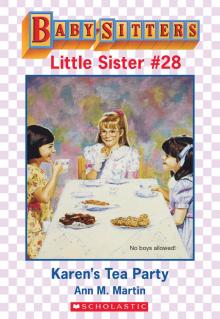 Karen's Tea Party
Karen's Tea Party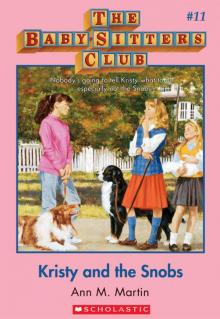 Kristy and the Snobs
Kristy and the Snobs Best Kept Secret
Best Kept Secret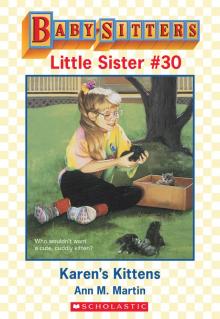 Karen's Kittens
Karen's Kittens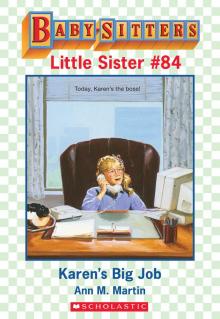 Karen's Big Job
Karen's Big Job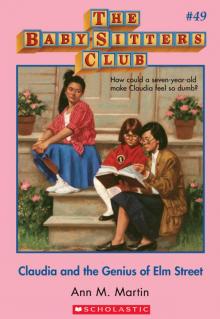 Claudia and the Genius of Elm Street
Claudia and the Genius of Elm Street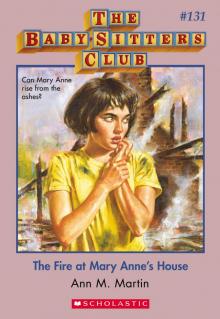 The Fire at Mary Anne's House
The Fire at Mary Anne's House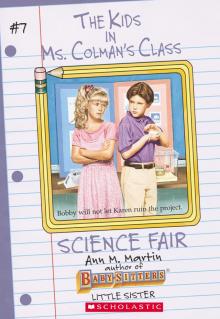 Science Fair
Science Fair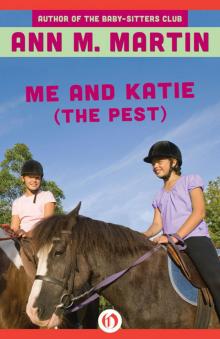 Me and Katie (The Pest)
Me and Katie (The Pest)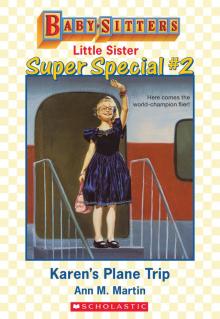 Karen's Plane Trip
Karen's Plane Trip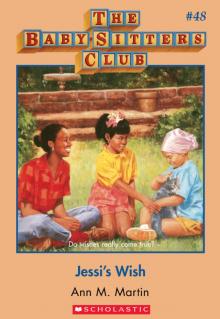 Jessi's Wish
Jessi's Wish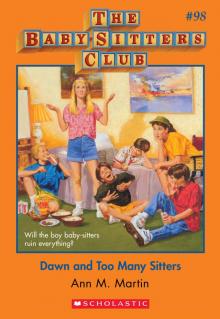 Dawn and Too Many Sitters
Dawn and Too Many Sitters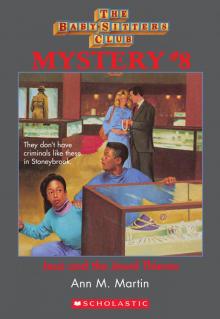 Jessi and the Jewel Thieves
Jessi and the Jewel Thieves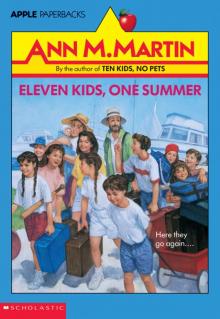 Eleven Kids, One Summer
Eleven Kids, One Summer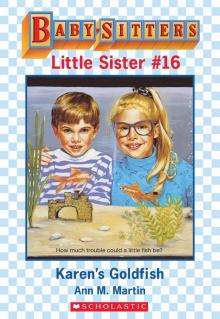 Karen's Goldfish
Karen's Goldfish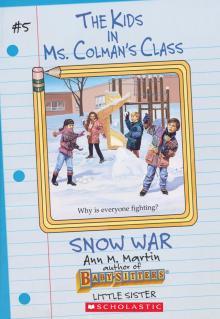 Snow War
Snow War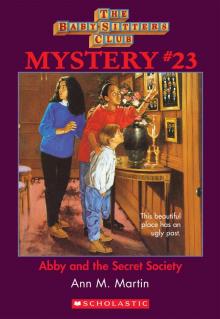 Abby and the Secret Society
Abby and the Secret Society Keeping Secrets
Keeping Secrets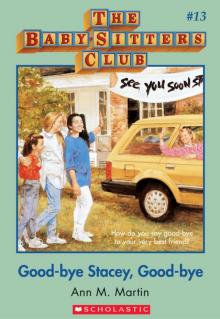 Good-Bye Stacey, Good-Bye
Good-Bye Stacey, Good-Bye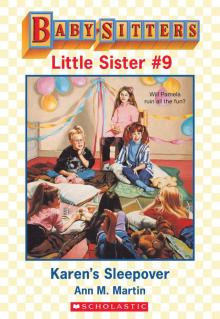 Karen's Sleepover
Karen's Sleepover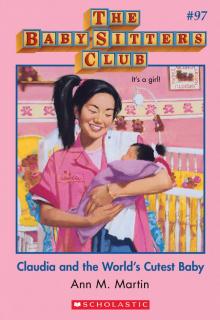 Claudia and the World's Cutest Baby
Claudia and the World's Cutest Baby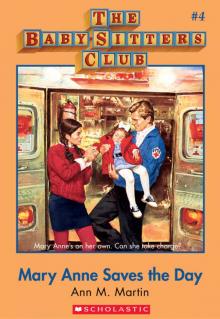 Mary Anne Saves the Day
Mary Anne Saves the Day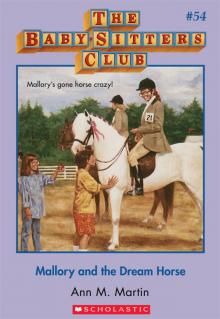 Mallory and the Dream Horse
Mallory and the Dream Horse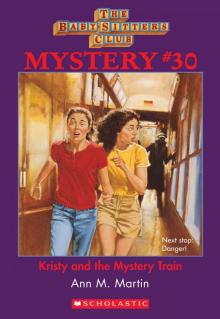 Kristy and the Mystery Train
Kristy and the Mystery Train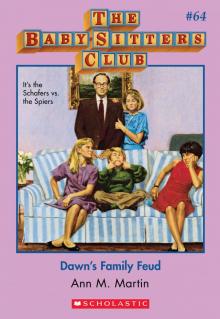 Dawn's Family Feud
Dawn's Family Feud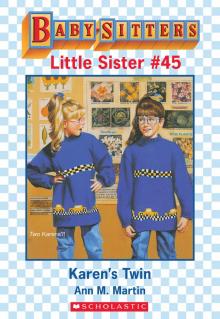 Karen's Twin
Karen's Twin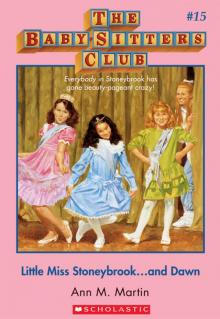 Little Miss Stoneybrook... And Dawn
Little Miss Stoneybrook... And Dawn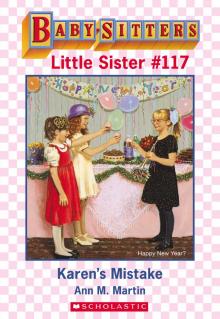 Karen's Mistake
Karen's Mistake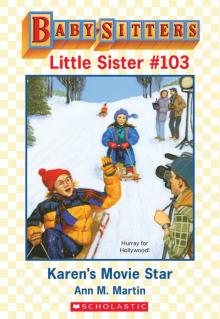 Karen's Movie Star
Karen's Movie Star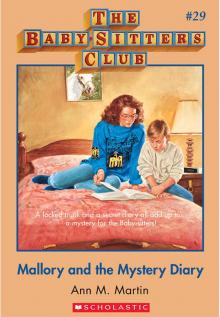 Mallory and the Mystery Diary
Mallory and the Mystery Diary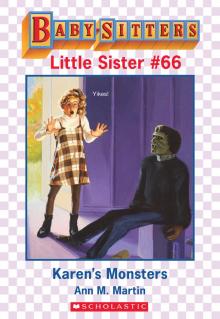 Karen's Monsters
Karen's Monsters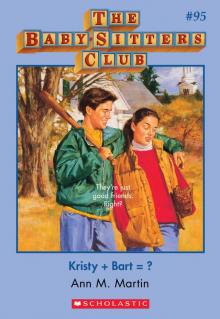 Kristy + Bart = ?
Kristy + Bart = ?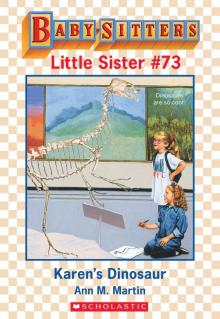 Karen's Dinosaur
Karen's Dinosaur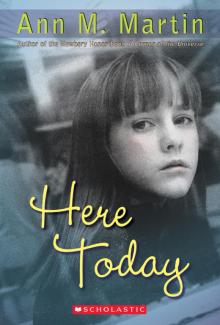 Here Today
Here Today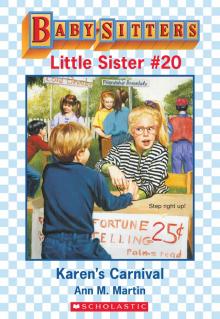 Karen's Carnival
Karen's Carnival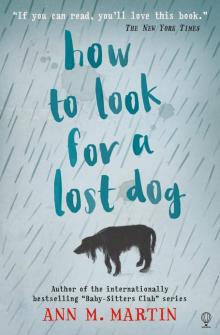 How to Look for a Lost Dog
How to Look for a Lost Dog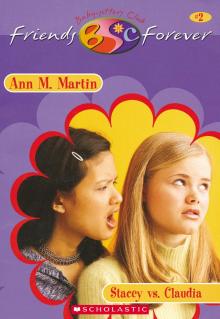 Stacey vs. Claudia
Stacey vs. Claudia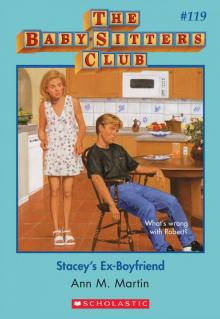 Stacey's Ex-Boyfriend
Stacey's Ex-Boyfriend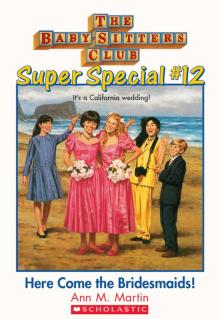 Here Come the Bridesmaids!
Here Come the Bridesmaids! Graduation Day
Graduation Day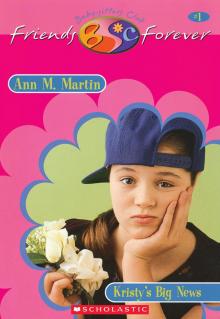 Kristy's Big News
Kristy's Big News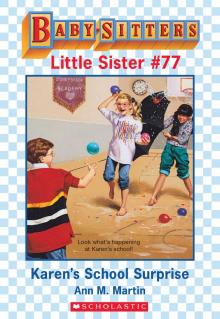 Karen's School Surprise
Karen's School Surprise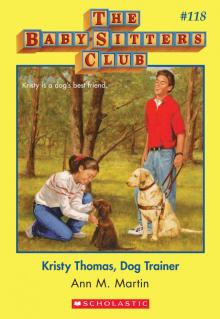 Kristy Thomas, Dog Trainer
Kristy Thomas, Dog Trainer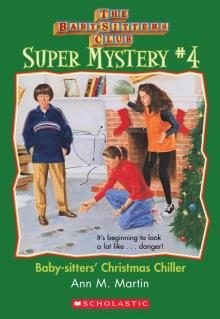 Baby-Sitters' Christmas Chiller
Baby-Sitters' Christmas Chiller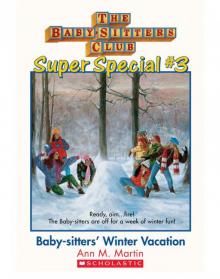 Baby-Sitters' Winter Vacation
Baby-Sitters' Winter Vacation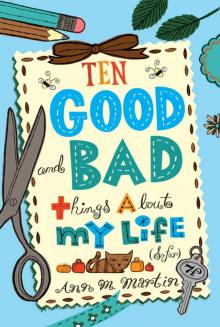 Ten Good and Bad Things About My Life
Ten Good and Bad Things About My Life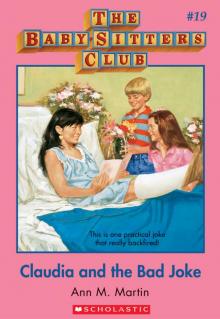 Claudia and the Bad Joke
Claudia and the Bad Joke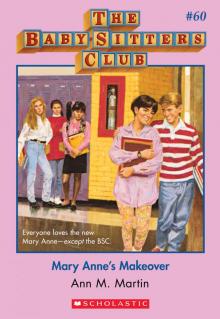 Mary Anne's Makeover
Mary Anne's Makeover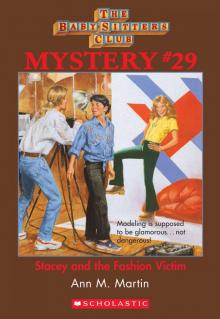 Stacey and the Fashion Victim
Stacey and the Fashion Victim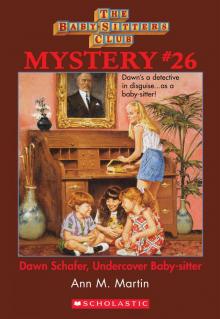 Dawn Schafer, Undercover Baby-Sitter
Dawn Schafer, Undercover Baby-Sitter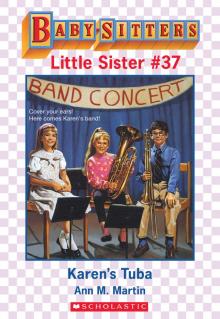 Karen's Tuba
Karen's Tuba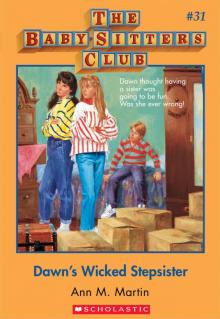 Dawn's Wicked Stepsister
Dawn's Wicked Stepsister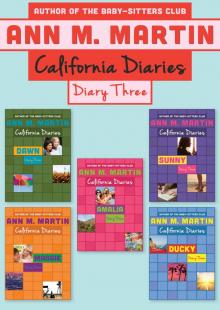 Diary Three: Dawn, Sunny, Maggie, Amalia, and Ducky
Diary Three: Dawn, Sunny, Maggie, Amalia, and Ducky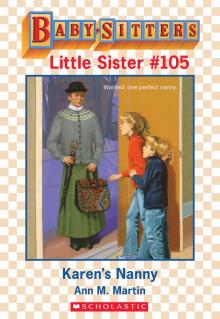 Karen's Nanny
Karen's Nanny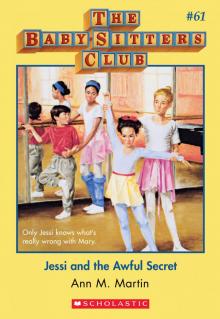 Jessi and the Awful Secret
Jessi and the Awful Secret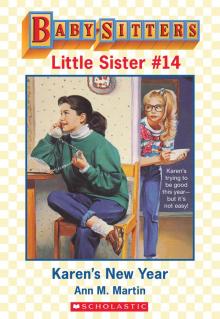 Karen's New Year
Karen's New Year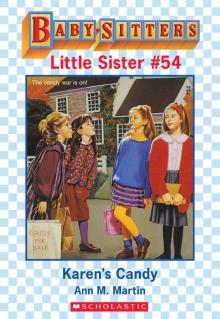 Karen's Candy
Karen's Candy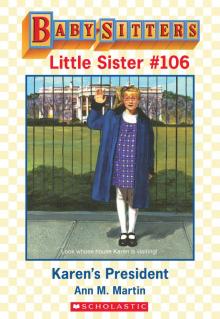 Karen's President
Karen's President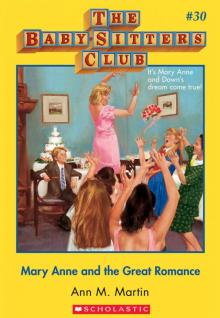 Mary Anne and the Great Romance
Mary Anne and the Great Romance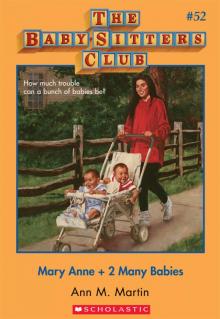 Mary Anne + 2 Many Babies
Mary Anne + 2 Many Babies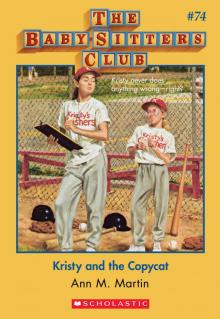 Kristy and the Copycat
Kristy and the Copycat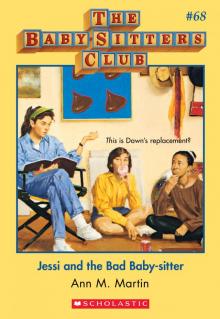 Jessi and the Bad Baby-Sitter
Jessi and the Bad Baby-Sitter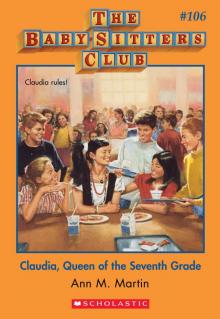 Claudia, Queen of the Seventh Grade
Claudia, Queen of the Seventh Grade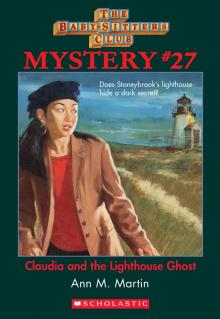 Claudia and the Lighthouse Ghost
Claudia and the Lighthouse Ghost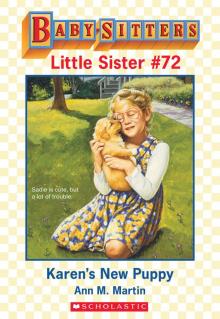 Karen's New Puppy
Karen's New Puppy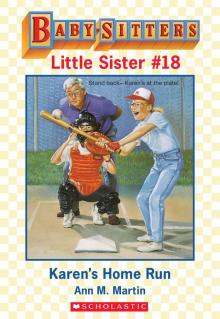 Karen's Home Run
Karen's Home Run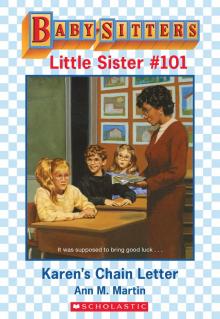 Karen's Chain Letter
Karen's Chain Letter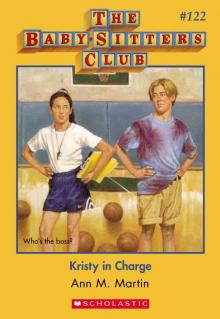 Kristy in Charge
Kristy in Charge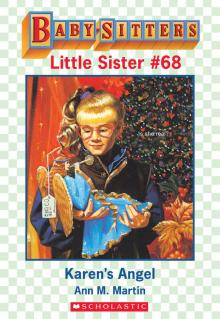 Karen's Angel
Karen's Angel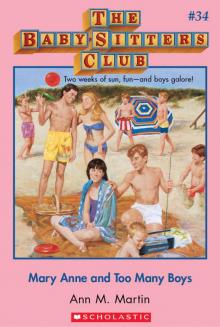 Mary Anne and Too Many Boys
Mary Anne and Too Many Boys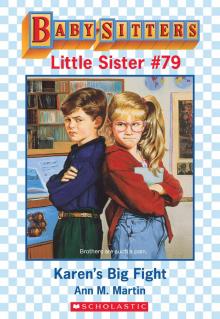 Karen's Big Fight
Karen's Big Fight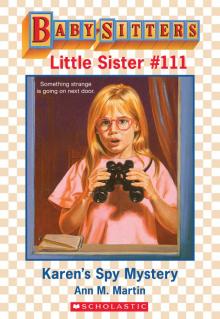 Karen's Spy Mystery
Karen's Spy Mystery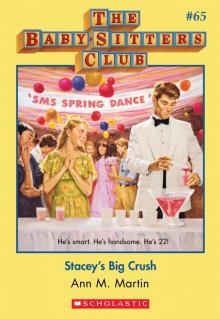 Stacey's Big Crush
Stacey's Big Crush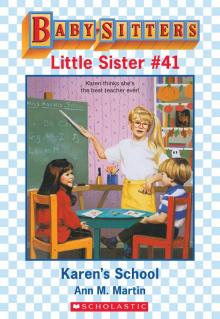 Karen's School
Karen's School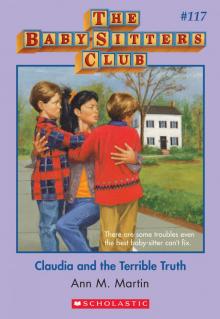 Claudia and the Terrible Truth
Claudia and the Terrible Truth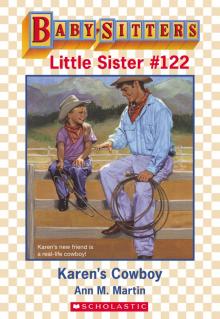 Karen's Cowboy
Karen's Cowboy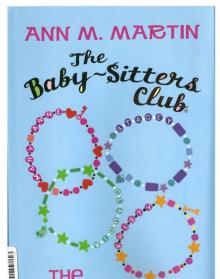 The Summer Before
The Summer Before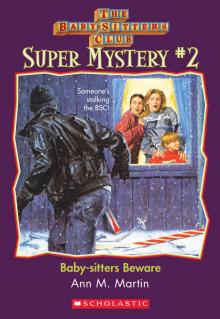 Beware, Dawn!
Beware, Dawn!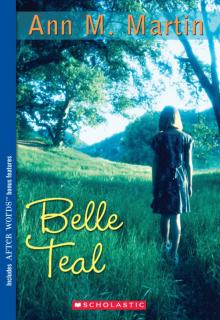 Belle Teale
Belle Teale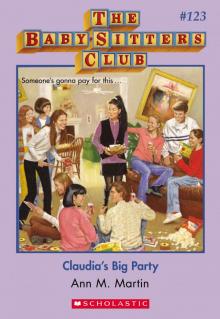 Claudia's Big Party
Claudia's Big Party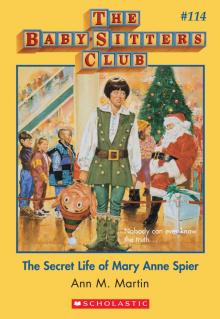 The Secret Life of Mary Anne Spier
The Secret Life of Mary Anne Spier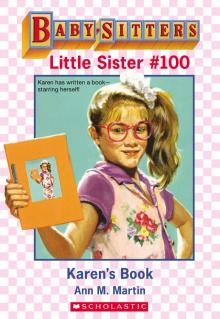 Karen's Book
Karen's Book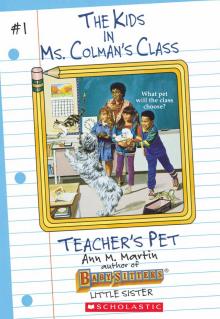 Teacher's Pet
Teacher's Pet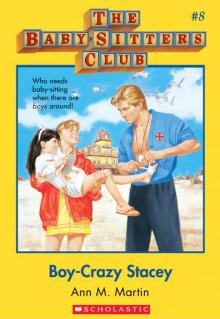 Boy-Crazy Stacey
Boy-Crazy Stacey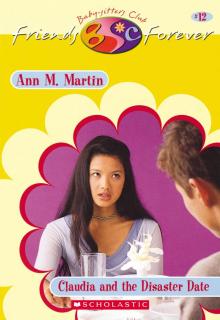 Claudia and the Disaster Date
Claudia and the Disaster Date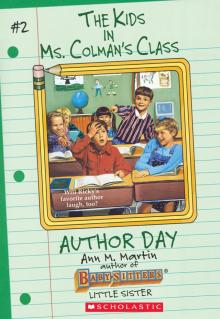 Author Day
Author Day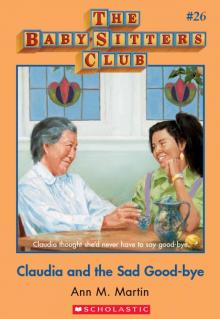 Claudia and the Sad Good-Bye
Claudia and the Sad Good-Bye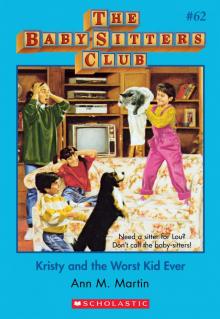 Kristy and the Worst Kid Ever
Kristy and the Worst Kid Ever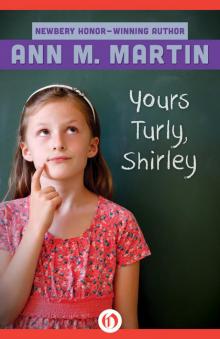 Yours Turly, Shirley
Yours Turly, Shirley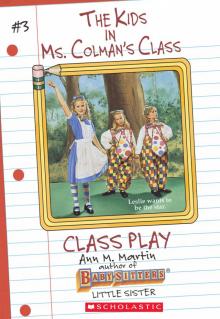 Class Play
Class Play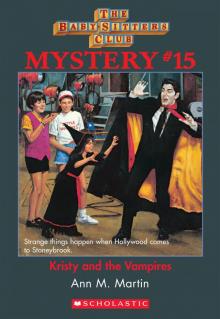 Kristy and the Vampires
Kristy and the Vampires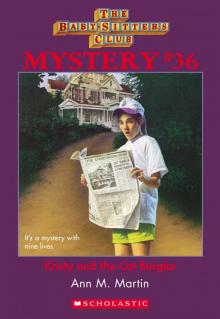 Kristy and the Cat Burglar
Kristy and the Cat Burglar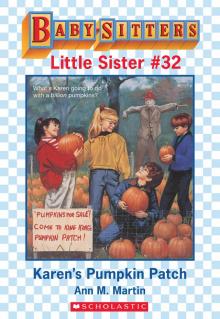 Karen's Pumpkin Patch
Karen's Pumpkin Patch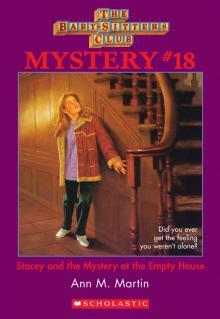 Stacey and the Mystery at the Empty House
Stacey and the Mystery at the Empty House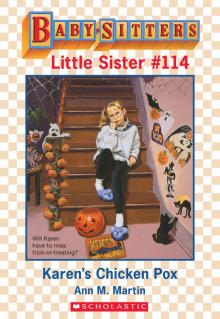 Karen's Chicken Pox
Karen's Chicken Pox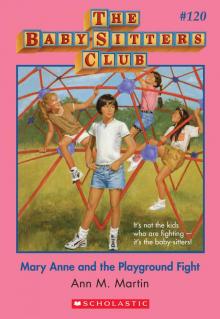 Mary Anne and the Playground Fight
Mary Anne and the Playground Fight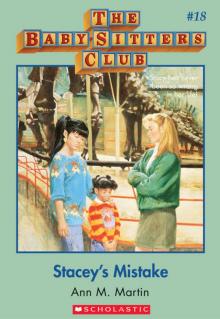 Stacey's Mistake
Stacey's Mistake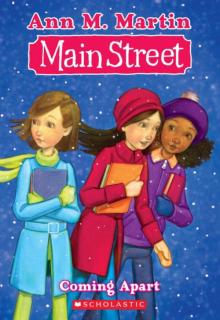 Coming Apart
Coming Apart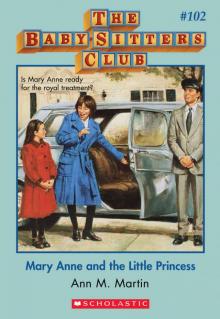 Mary Anne and the Little Princess
Mary Anne and the Little Princess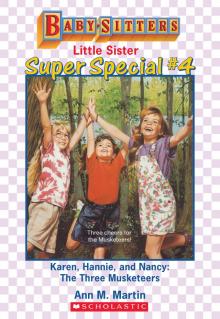 Karen, Hannie and Nancy: The Three Musketeers
Karen, Hannie and Nancy: The Three Musketeers 'Tis the Season
'Tis the Season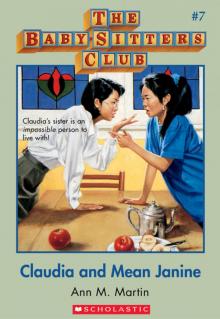 Claudia and Mean Janine
Claudia and Mean Janine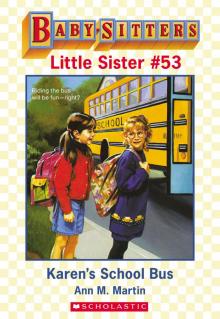 Karen's School Bus
Karen's School Bus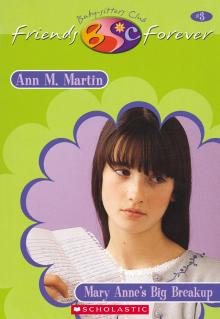 Mary Anne's Big Breakup
Mary Anne's Big Breakup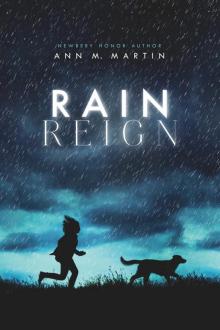 Rain Reign
Rain Reign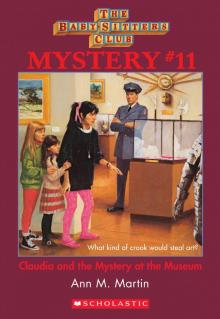 Claudia and the Mystery at the Museum
Claudia and the Mystery at the Museum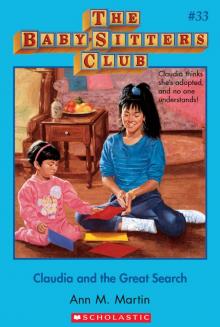 Claudia and the Great Search
Claudia and the Great Search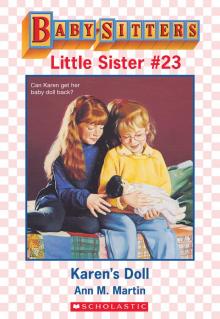 Karen's Doll
Karen's Doll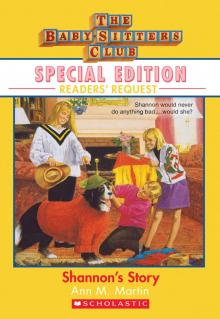 Shannon's Story
Shannon's Story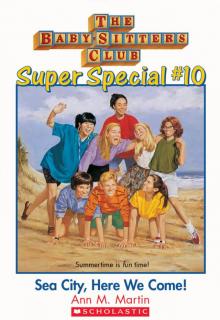 Sea City, Here We Come!
Sea City, Here We Come!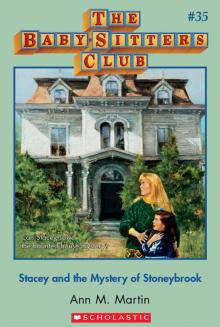 Stacey and the Mystery of Stoneybrook
Stacey and the Mystery of Stoneybrook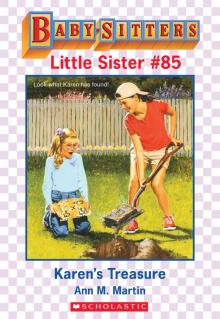 Karen's Treasure
Karen's Treasure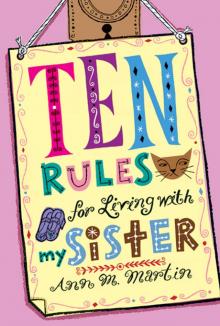 Ten Rules for Living With My Sister
Ten Rules for Living With My Sister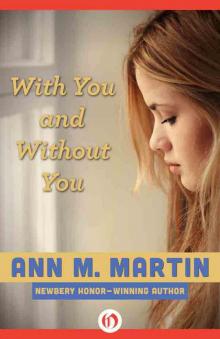 With You and Without You
With You and Without You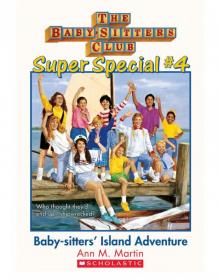 Baby-Sitters' Island Adventure
Baby-Sitters' Island Adventure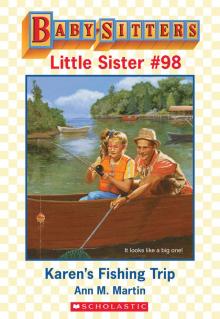 Karen's Fishing Trip
Karen's Fishing Trip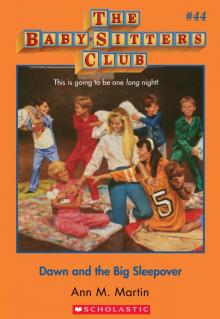 Dawn and the Big Sleepover
Dawn and the Big Sleepover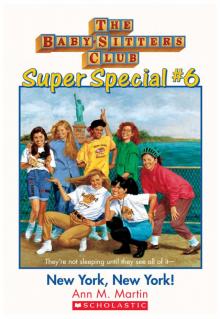 New York, New York!
New York, New York!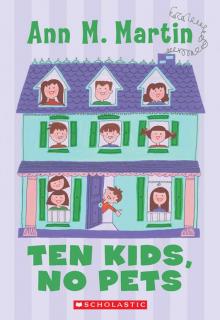 Ten Kids, No Pets
Ten Kids, No Pets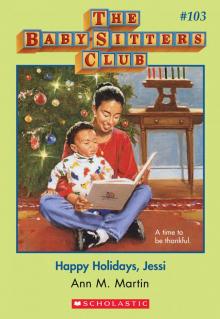 Happy Holidays, Jessi
Happy Holidays, Jessi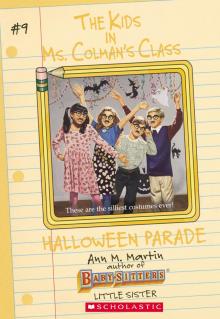 Halloween Parade
Halloween Parade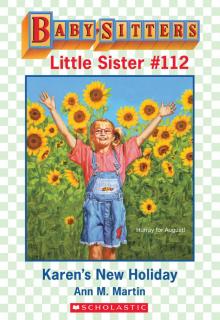 Karen's New Holiday
Karen's New Holiday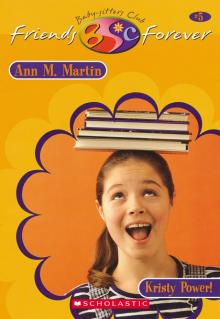 Kristy Power!
Kristy Power!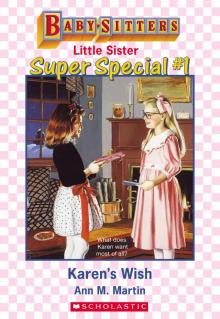 Karen's Wish
Karen's Wish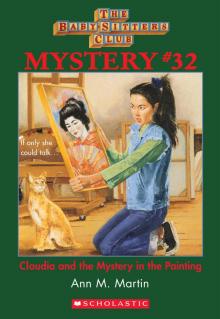 Claudia and the Mystery in the Painting
Claudia and the Mystery in the Painting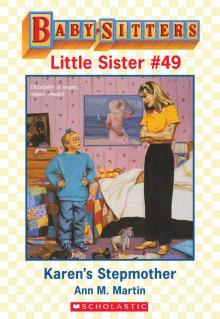 Karen's Stepmother
Karen's Stepmother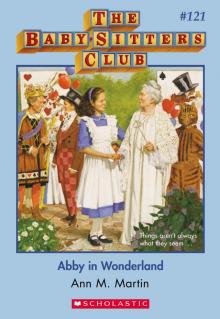 Abby in Wonderland
Abby in Wonderland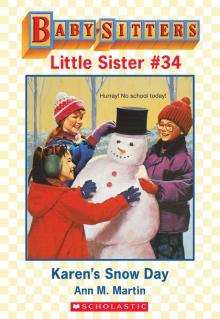 Karen's Snow Day
Karen's Snow Day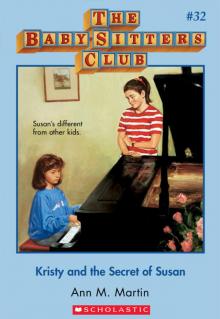 Kristy and the Secret of Susan
Kristy and the Secret of Susan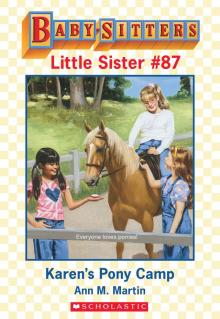 Karen's Pony Camp
Karen's Pony Camp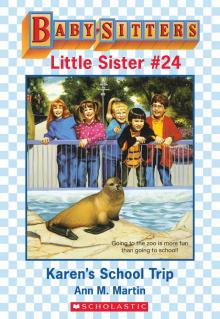 Karen's School Trip
Karen's School Trip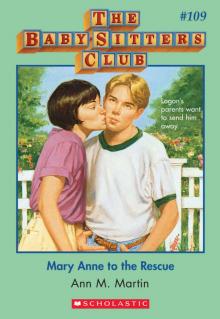 Mary Anne to the Rescue
Mary Anne to the Rescue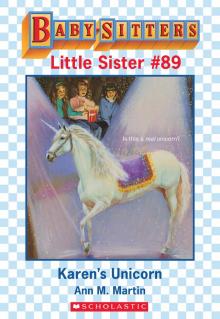 Karen's Unicorn
Karen's Unicorn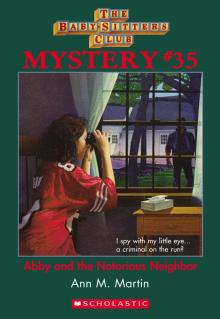 Abby and the Notorious Neighbor
Abby and the Notorious Neighbor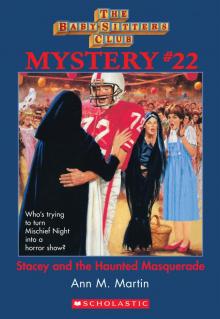 Stacey and the Haunted Masquerade
Stacey and the Haunted Masquerade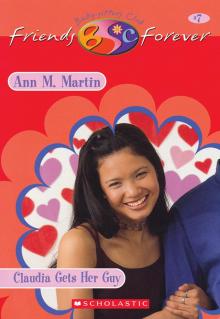 Claudia Gets Her Guy
Claudia Gets Her Guy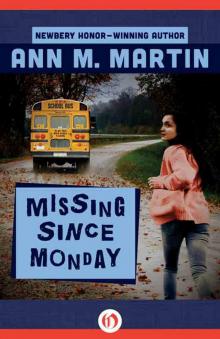 Missing Since Monday
Missing Since Monday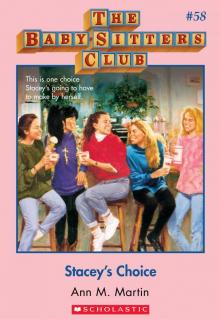 Stacey's Choice
Stacey's Choice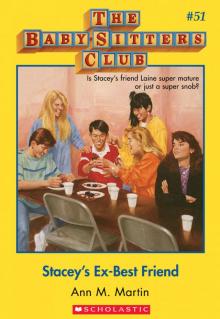 Stacey's Ex-Best Friend
Stacey's Ex-Best Friend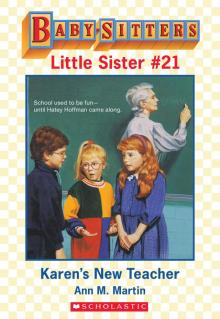 Karen's New Teacher
Karen's New Teacher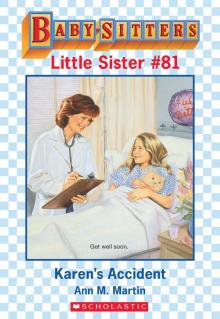 Karen's Accident
Karen's Accident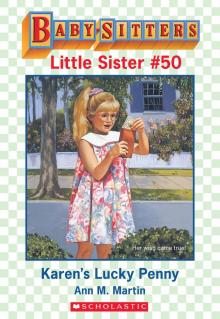 Karen's Lucky Penny
Karen's Lucky Penny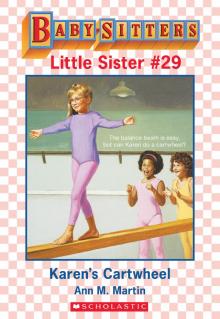 Karen's Cartwheel
Karen's Cartwheel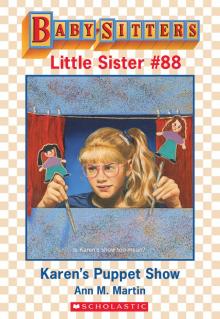 Karen's Puppet Show
Karen's Puppet Show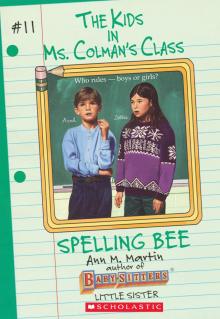 Spelling Bee
Spelling Bee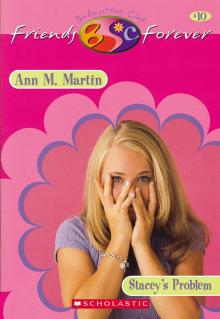 Stacey's Problem
Stacey's Problem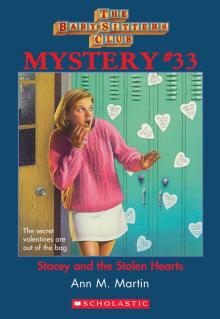 Stacey and the Stolen Hearts
Stacey and the Stolen Hearts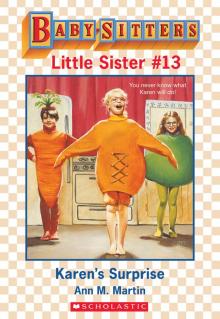 Karen's Surprise
Karen's Surprise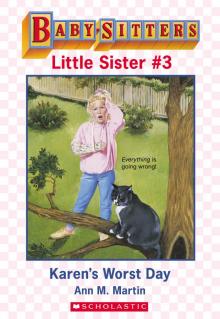 Karen's Worst Day
Karen's Worst Day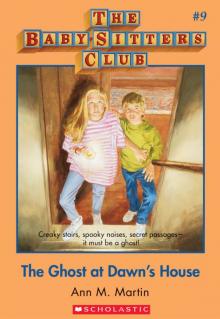 The Ghost at Dawn's House
The Ghost at Dawn's House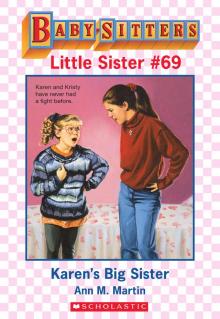 Karen's Big Sister
Karen's Big Sister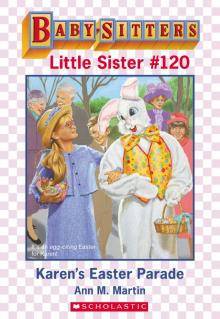 Karen's Easter Parade
Karen's Easter Parade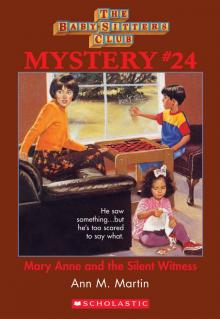 Mary Anne and the Silent Witness
Mary Anne and the Silent Witness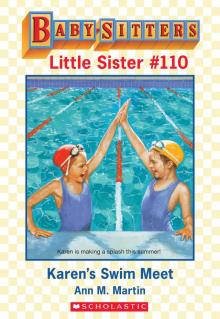 Karen's Swim Meet
Karen's Swim Meet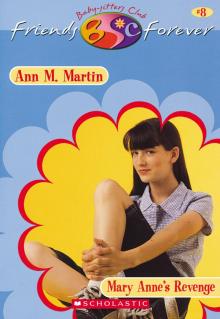 Mary Anne's Revenge
Mary Anne's Revenge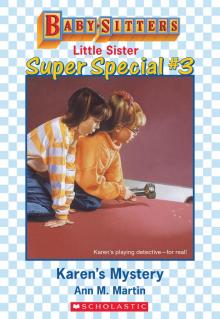 Karen's Mystery
Karen's Mystery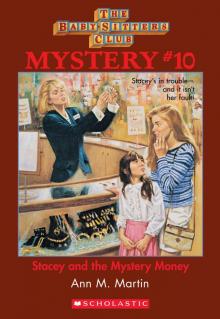 Stacey and the Mystery Money
Stacey and the Mystery Money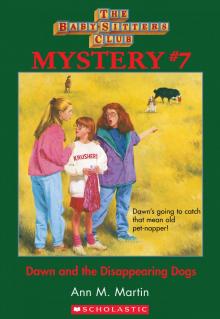 Dawn and the Disappearing Dogs
Dawn and the Disappearing Dogs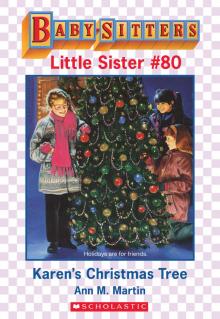 Karen's Christmas Tree
Karen's Christmas Tree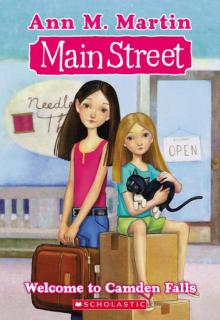 Welcome to Camden Falls
Welcome to Camden Falls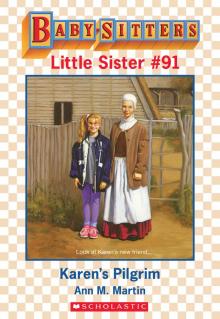 Karen's Pilgrim
Karen's Pilgrim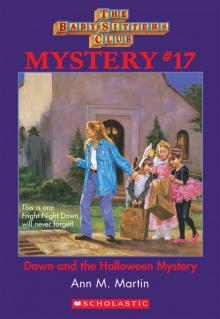 Dawn and the Halloween Mystery
Dawn and the Halloween Mystery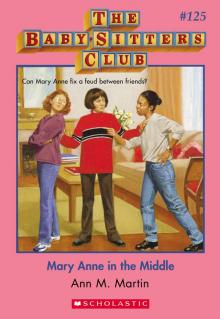 Mary Anne in the Middle
Mary Anne in the Middle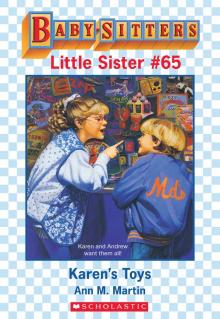 Karen's Toys
Karen's Toys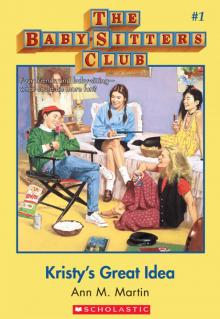 Kristy's Great Idea
Kristy's Great Idea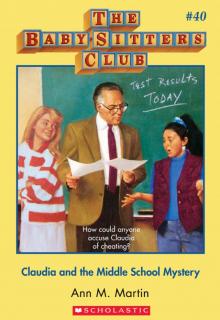 Claudia and the Middle School Mystery
Claudia and the Middle School Mystery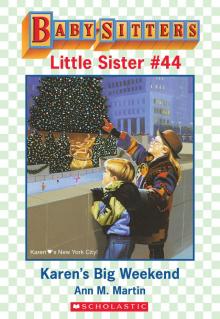 Karen's Big Weekend
Karen's Big Weekend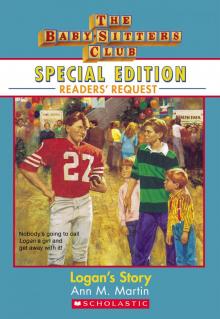 Logan's Story
Logan's Story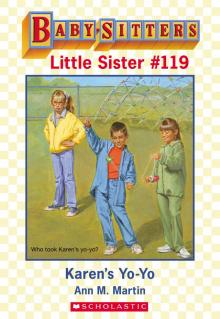 Karen's Yo-Yo
Karen's Yo-Yo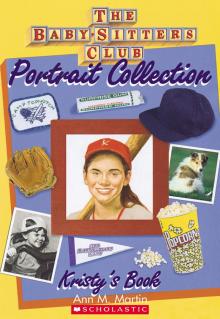 Kristy's Book
Kristy's Book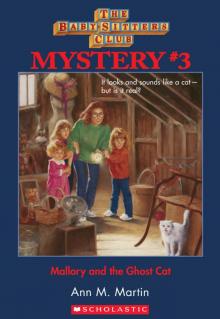 Mallory and the Ghost Cat
Mallory and the Ghost Cat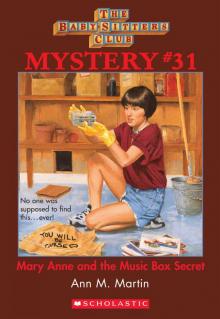 Mary Anne and the Music
Mary Anne and the Music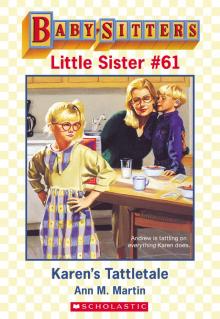 Karen's Tattletale
Karen's Tattletale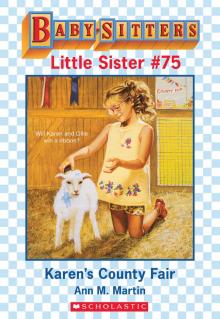 Karen's County Fair
Karen's County Fair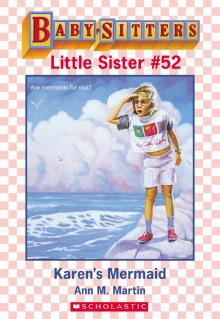 Karen's Mermaid
Karen's Mermaid Snowbound
Snowbound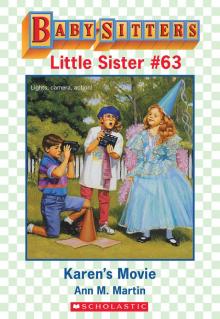 Karen's Movie
Karen's Movie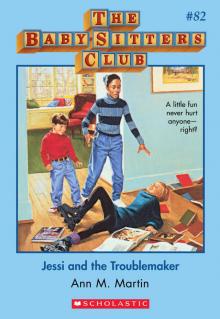 Jessi and the Troublemaker
Jessi and the Troublemaker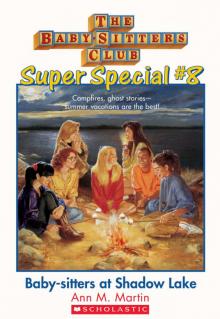 Baby-Sitters at Shadow Lake
Baby-Sitters at Shadow Lake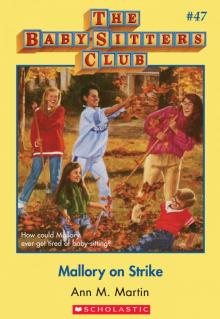 Mallory on Strike
Mallory on Strike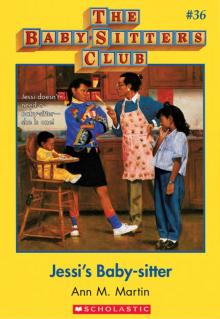 Jessi's Baby-Sitter
Jessi's Baby-Sitter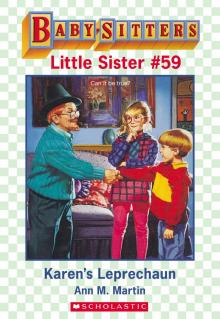 Karen's Leprechaun
Karen's Leprechaun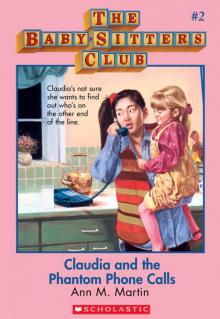 Claudia and the Phantom Phone Calls
Claudia and the Phantom Phone Calls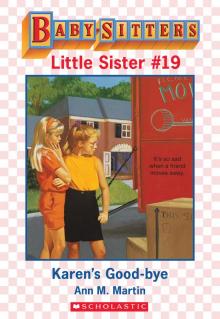 Karen's Good-Bye
Karen's Good-Bye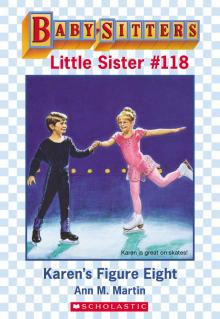 Karen's Figure Eight
Karen's Figure Eight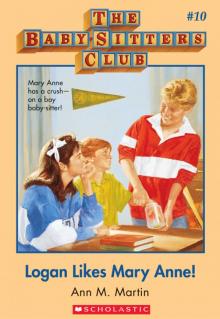 Logan Likes Mary Anne!
Logan Likes Mary Anne!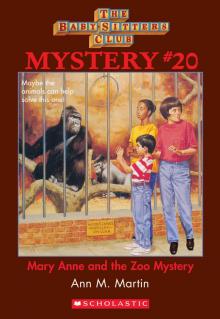 Mary Anne and the Zoo Mystery
Mary Anne and the Zoo Mystery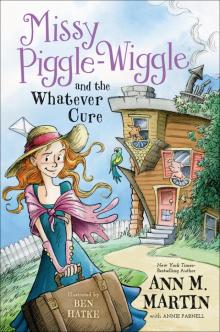 Missy Piggle-Wiggle and the Whatever Cure
Missy Piggle-Wiggle and the Whatever Cure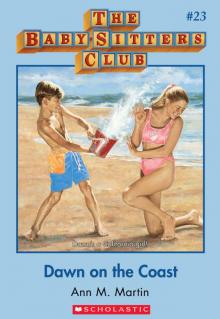 Dawn on the Coast
Dawn on the Coast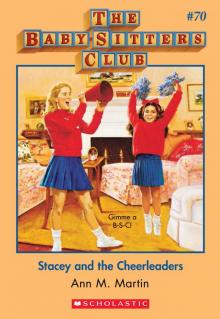 Stacey and the Cheerleaders
Stacey and the Cheerleaders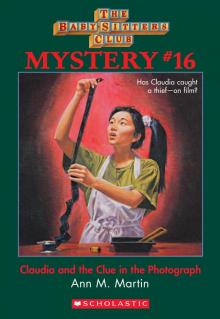 Claudia and the Clue in the Photograph
Claudia and the Clue in the Photograph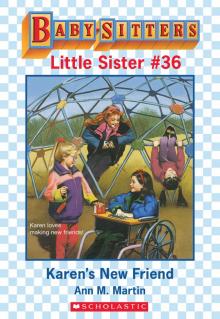 Karen's New Friend
Karen's New Friend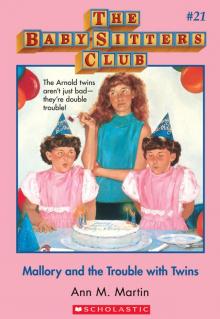 Mallory and the Trouble With Twins
Mallory and the Trouble With Twins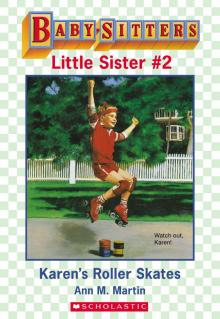 Karen's Roller Skates
Karen's Roller Skates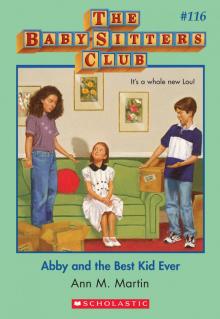 Abby and the Best Kid Ever
Abby and the Best Kid Ever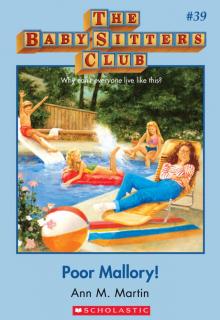 Poor Mallory!
Poor Mallory!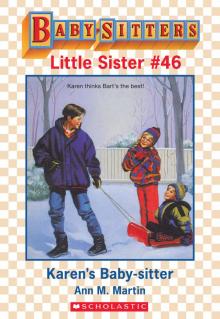 Karen's Witch
Karen's Witch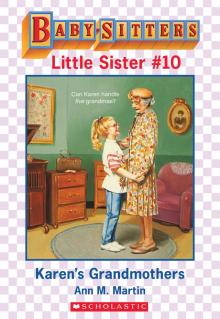 Karen's Grandmothers
Karen's Grandmothers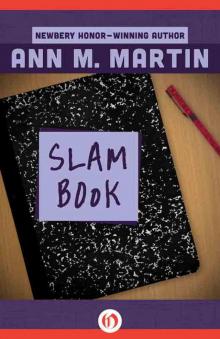 Slam Book
Slam Book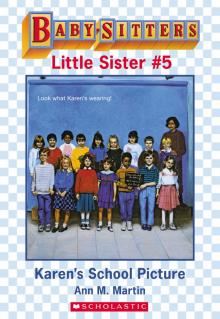 Karen's School Picture
Karen's School Picture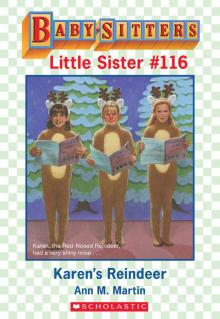 Karen's Reindeer
Karen's Reindeer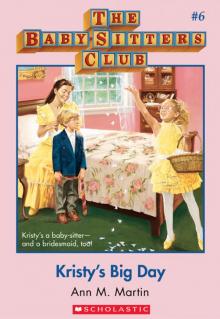 Kristy's Big Day
Kristy's Big Day The Long Way Home
The Long Way Home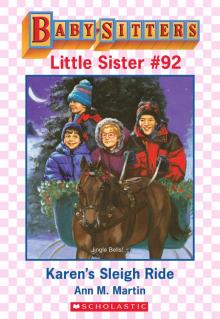 Karen's Sleigh Ride
Karen's Sleigh Ride On Christmas Eve
On Christmas Eve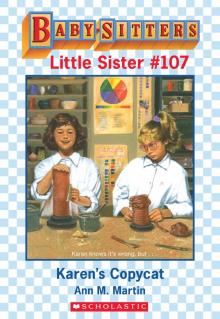 Karen's Copycat
Karen's Copycat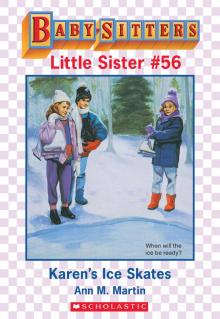 Karen's Ice Skates
Karen's Ice Skates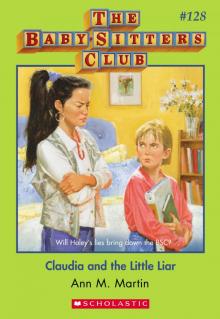 Claudia and the Little Liar
Claudia and the Little Liar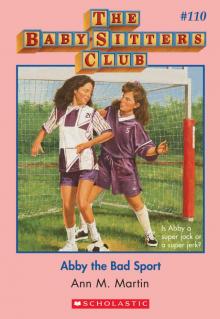 Abby the Bad Sport
Abby the Bad Sport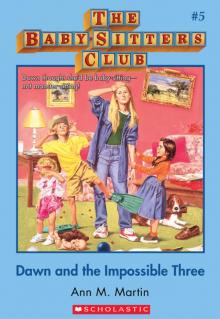 The Baby-Sitters Club #5: Dawn and the Impossible Three
The Baby-Sitters Club #5: Dawn and the Impossible Three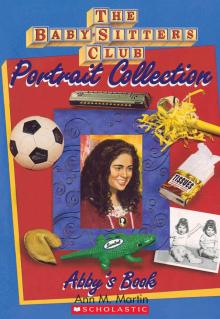 Abby's Book
Abby's Book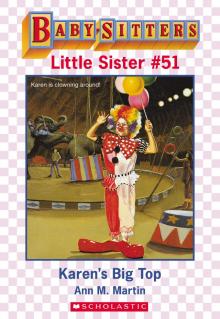 Karen's Big Top
Karen's Big Top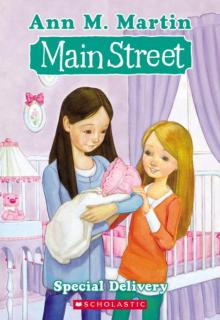 Main Street #8: Special Delivery
Main Street #8: Special Delivery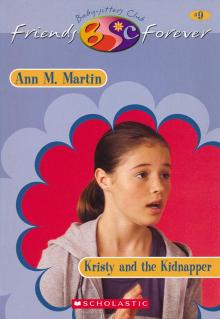 Kristy and the Kidnapper
Kristy and the Kidnapper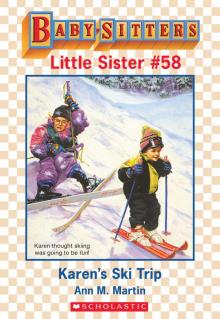 Karen's Ski Trip
Karen's Ski Trip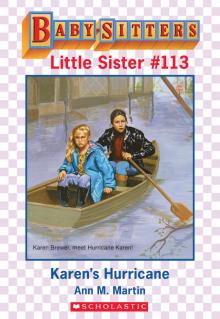 Karen's Hurricane
Karen's Hurricane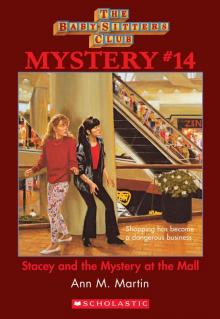 Stacey and the Mystery at the Mall
Stacey and the Mystery at the Mall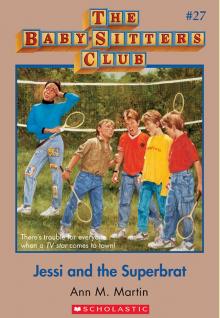 Jessi and the Superbrat
Jessi and the Superbrat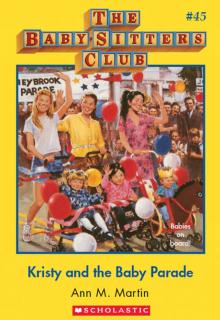 Kristy and the Baby Parade
Kristy and the Baby Parade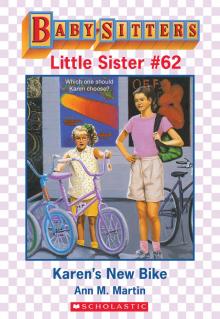 Karen's New Bike
Karen's New Bike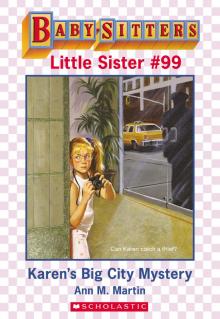 Karen's Big City Mystery
Karen's Big City Mystery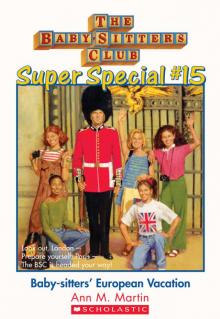 Baby-Sitters' European Vacation
Baby-Sitters' European Vacation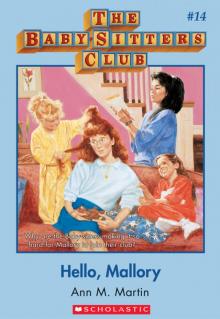 Hello, Mallory
Hello, Mallory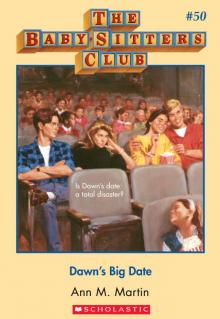 Dawn's Big Date
Dawn's Big Date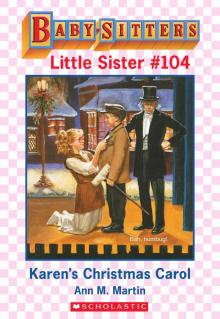 Karen's Christmas Carol
Karen's Christmas Carol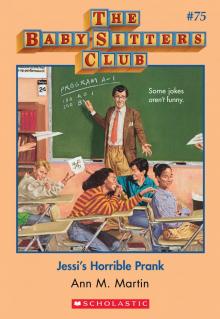 Jessi's Horrible Prank
Jessi's Horrible Prank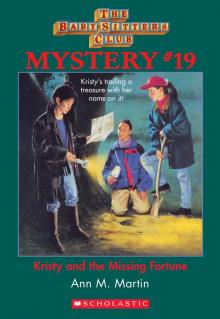 Kristy and the Missing Fortune
Kristy and the Missing Fortune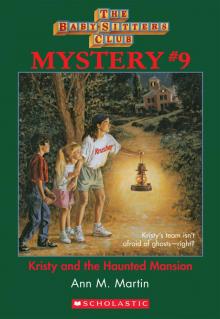 Kristy and the Haunted Mansion
Kristy and the Haunted Mansion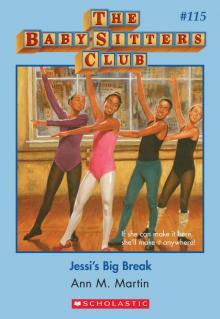 Jessi's Big Break
Jessi's Big Break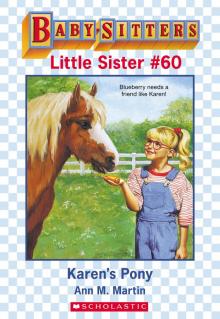 Karen's Pony
Karen's Pony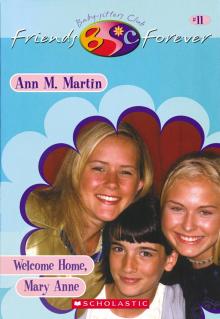 Welcome Home, Mary Anne
Welcome Home, Mary Anne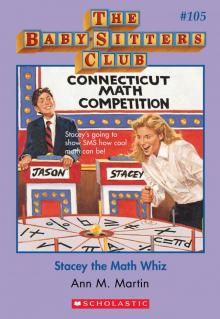 Stacey the Math Whiz
Stacey the Math Whiz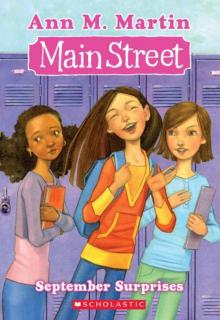 September Surprises
September Surprises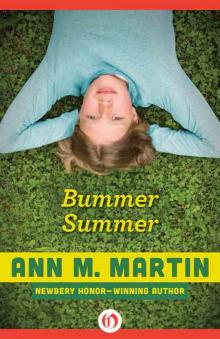 Bummer Summer
Bummer Summer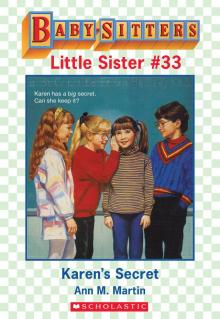 Karen's Secret
Karen's Secret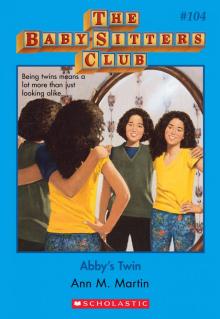 Abby's Twin
Abby's Twin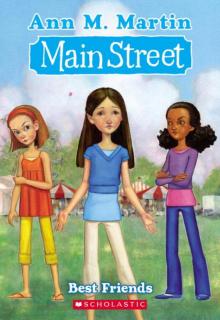 Main Street #4: Best Friends
Main Street #4: Best Friends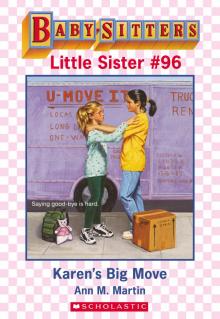 Karen's Big Move
Karen's Big Move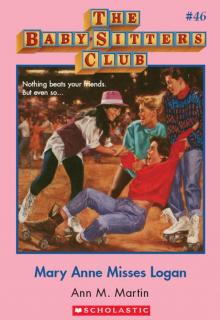 Mary Anne Misses Logan
Mary Anne Misses Logan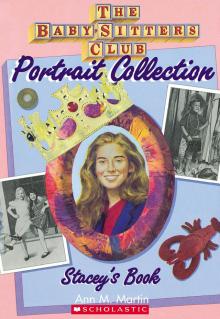 Stacey's Book
Stacey's Book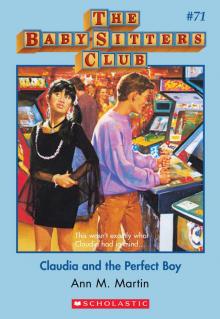 Claudia and the Perfect Boy
Claudia and the Perfect Boy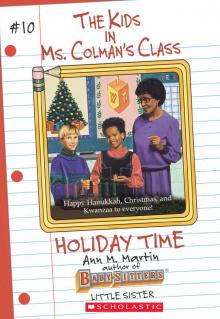 Holiday Time
Holiday Time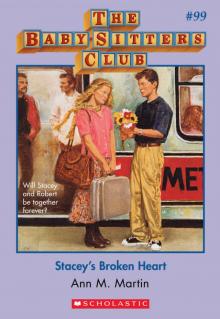 Stacey's Broken Heart
Stacey's Broken Heart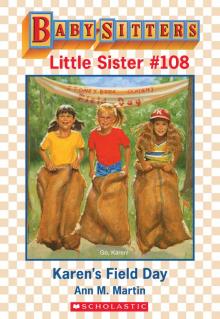 Karen's Field Day
Karen's Field Day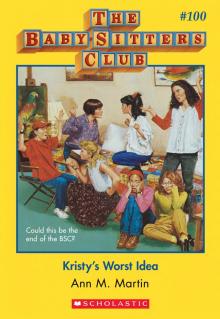 Kristy's Worst Idea
Kristy's Worst Idea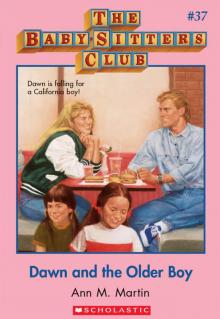 Dawn and the Older Boy
Dawn and the Older Boy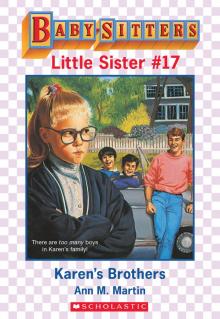 Karen's Brothers
Karen's Brothers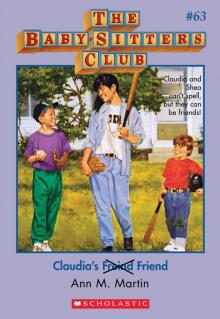 Claudia's Friend
Claudia's Friend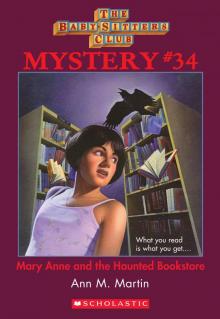 Mary Anne and the Haunted Bookstore
Mary Anne and the Haunted Bookstore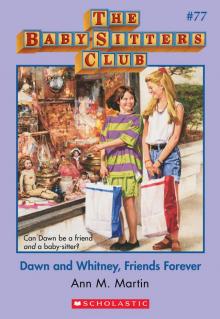 Dawn and Whitney, Friends Forever
Dawn and Whitney, Friends Forever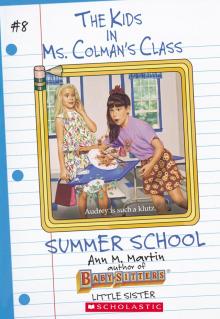 Summer School
Summer School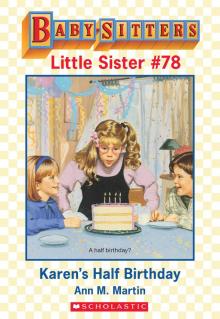 Karen's Birthday
Karen's Birthday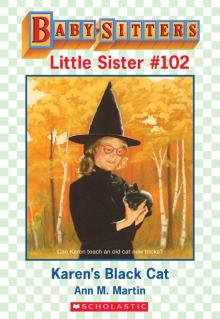 Karen's Black Cat
Karen's Black Cat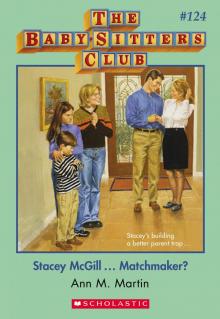 Stacey McGill... Matchmaker?
Stacey McGill... Matchmaker?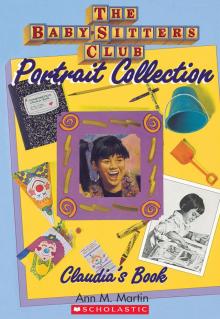 Claudia's Book
Claudia's Book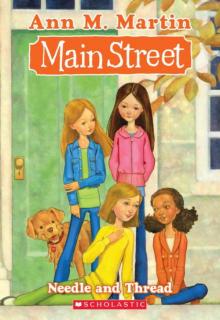 Main Street #2: Needle and Thread
Main Street #2: Needle and Thread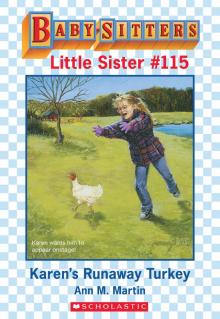 Karen's Runaway Turkey
Karen's Runaway Turkey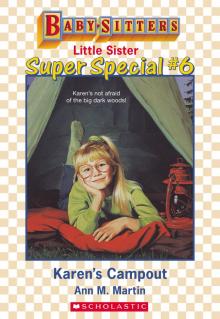 Karen's Campout
Karen's Campout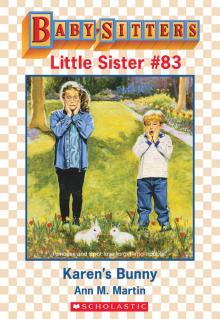 Karen's Bunny
Karen's Bunny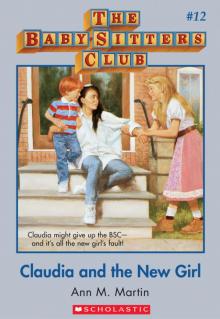 Claudia and the New Girl
Claudia and the New Girl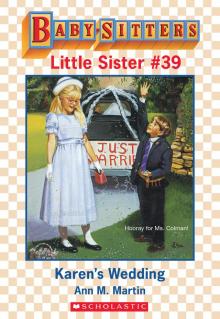 Karen's Wedding
Karen's Wedding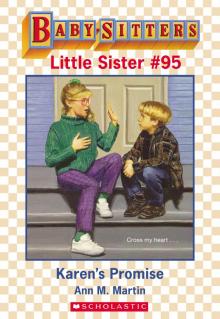 Karen's Promise
Karen's Promise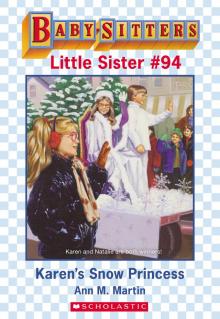 Karen's Snow Princess
Karen's Snow Princess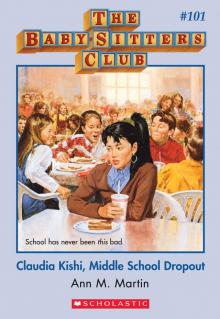 Claudia Kishi, Middle School Dropout
Claudia Kishi, Middle School Dropout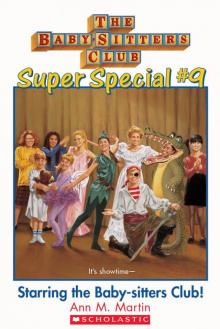 Starring the Baby-Sitters Club!
Starring the Baby-Sitters Club!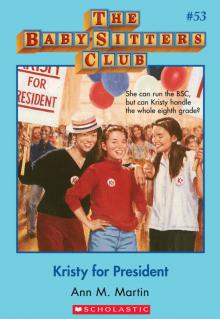 Kristy for President
Kristy for President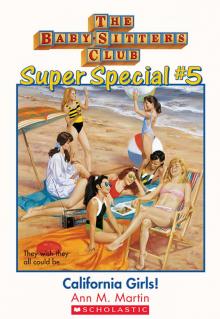 California Girls!
California Girls!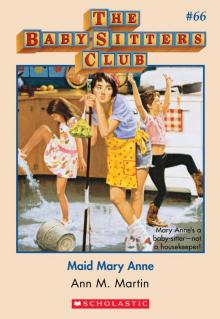 Maid Mary Anne
Maid Mary Anne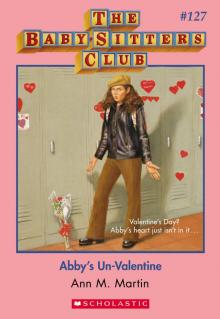 Abby's Un-Valentine
Abby's Un-Valentine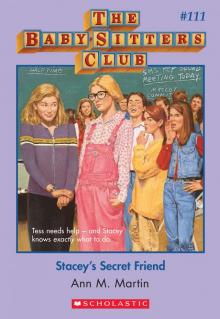 Stacey's Secret Friend
Stacey's Secret Friend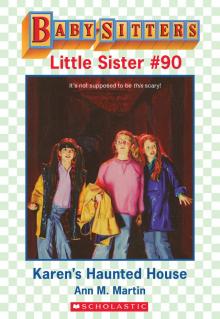 Karen's Haunted House
Karen's Haunted House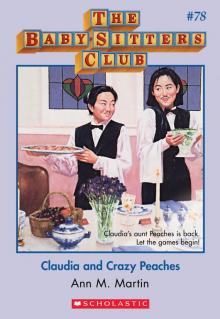 Claudia and Crazy Peaches
Claudia and Crazy Peaches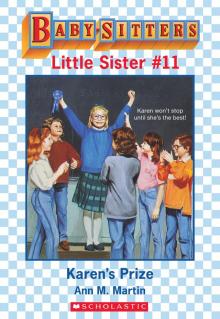 Karen's Prize
Karen's Prize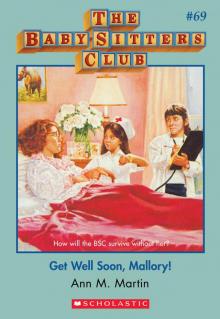 Get Well Soon, Mallory!
Get Well Soon, Mallory!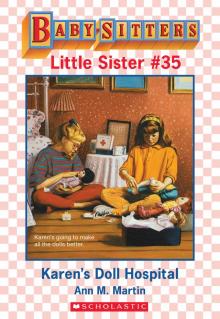 Karen's Doll Hospital
Karen's Doll Hospital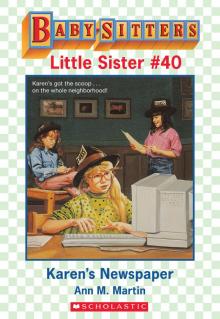 Karen's Newspaper
Karen's Newspaper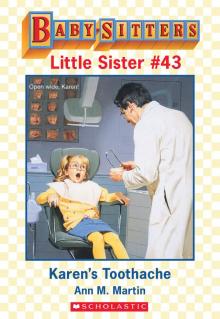 Karen's Toothache
Karen's Toothache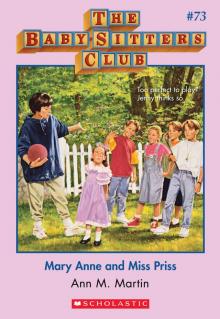 Mary Anne and Miss Priss
Mary Anne and Miss Priss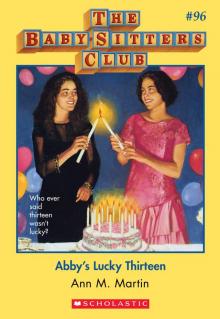 Abby's Lucky Thirteen
Abby's Lucky Thirteen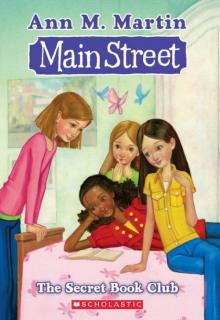 The Secret Book Club
The Secret Book Club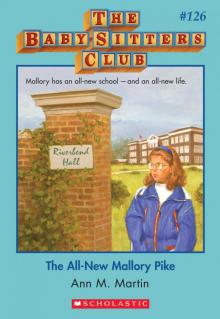 The All-New Mallory Pike
The All-New Mallory Pike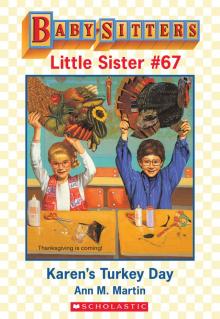 Karen's Turkey Day
Karen's Turkey Day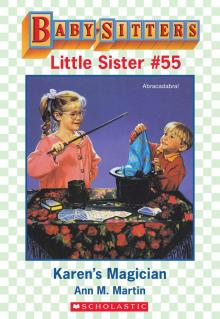 Karen's Magician
Karen's Magician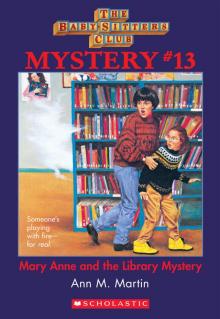 Mary Anne and the Library Mystery
Mary Anne and the Library Mystery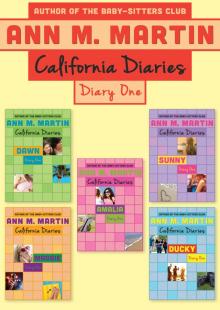 Diary One: Dawn, Sunny, Maggie, Amalia, and Ducky
Diary One: Dawn, Sunny, Maggie, Amalia, and Ducky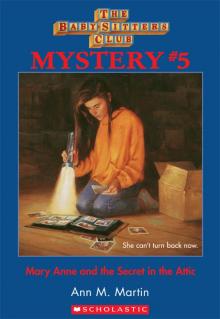 Mary Anne and the Secret in the Attic
Mary Anne and the Secret in the Attic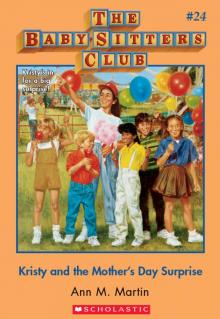 Kristy and the Mother's Day Surprise
Kristy and the Mother's Day Surprise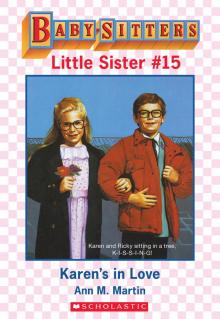 Karen's in Love
Karen's in Love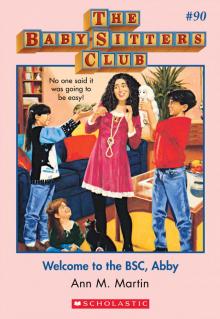 Welcome to the BSC, Abby
Welcome to the BSC, Abby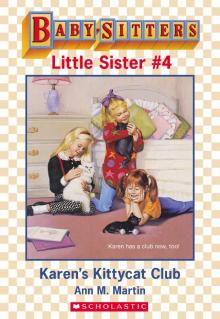 Karen's Kittycat Club
Karen's Kittycat Club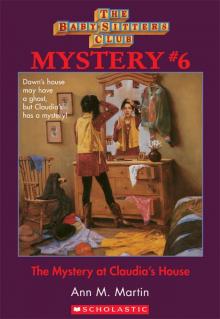 The Mystery at Claudia's House
The Mystery at Claudia's House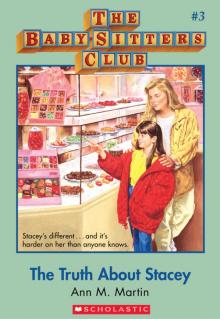 The Truth About Stacey
The Truth About Stacey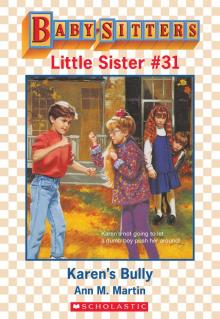 Karen's Bully
Karen's Bully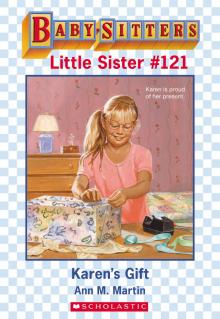 Karen's Gift
Karen's Gift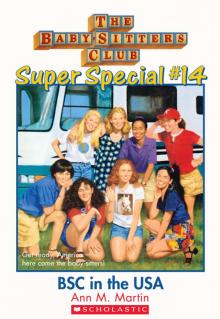 BSC in the USA
BSC in the USA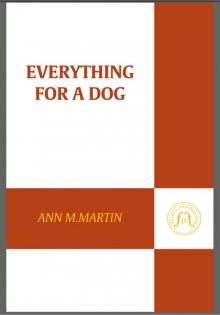 Everything for a Dog
Everything for a Dog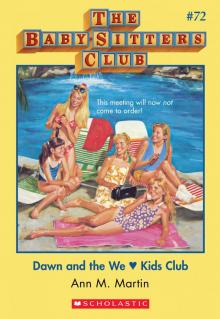 Dawn and the We Love Kids Club
Dawn and the We Love Kids Club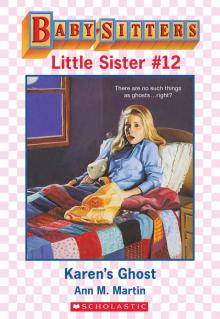 Karen's Ghost
Karen's Ghost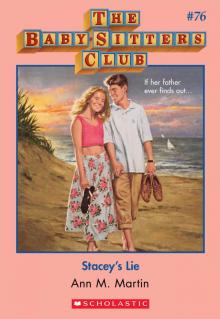 Stacey's Lie
Stacey's Lie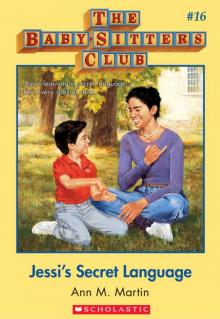 Jessi's Secret Language
Jessi's Secret Language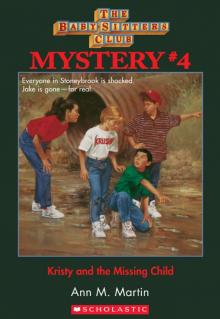 Kristy and the Missing Child
Kristy and the Missing Child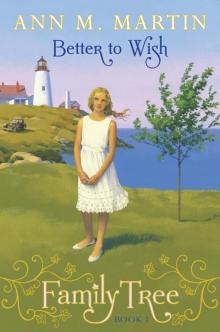 Better to Wish
Better to Wish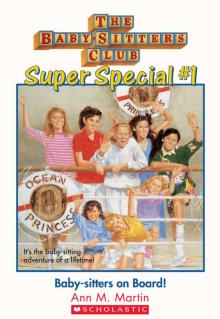 Baby-Sitters on Board!
Baby-Sitters on Board!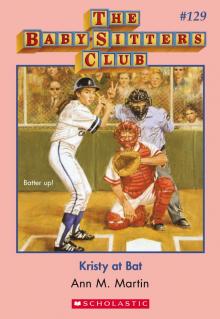 Kristy at Bat
Kristy at Bat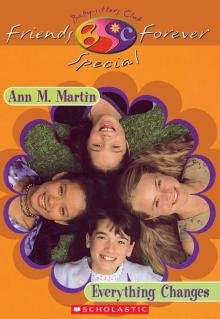 Everything Changes
Everything Changes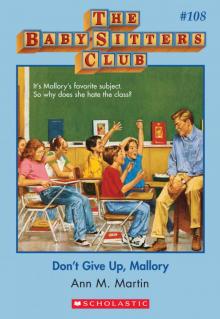 Don't Give Up, Mallory
Don't Give Up, Mallory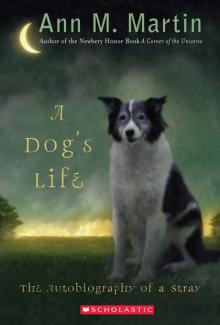 A Dog's Life: The Autobiography of a Stray
A Dog's Life: The Autobiography of a Stray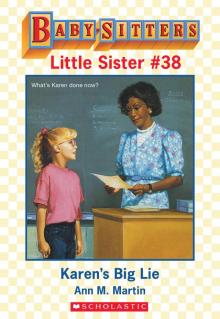 Karen's Big Lie
Karen's Big Lie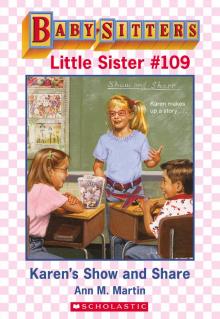 Karen's Show and Share
Karen's Show and Share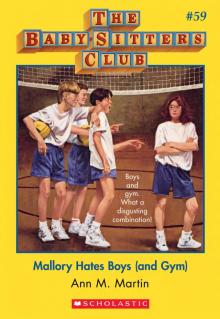 Mallory Hates Boys (and Gym)
Mallory Hates Boys (and Gym)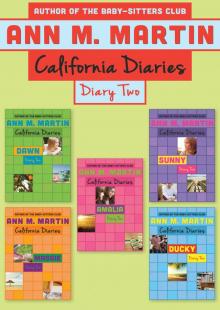 Diary Two: Dawn, Sunny, Maggie, Amalia, and Ducky
Diary Two: Dawn, Sunny, Maggie, Amalia, and Ducky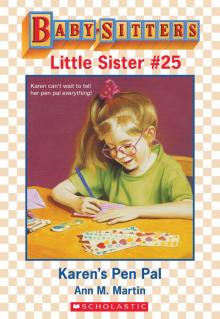 Karen's Pen Pal
Karen's Pen Pal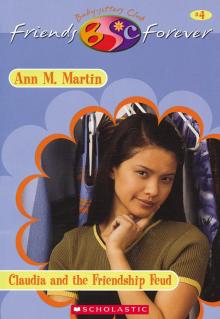 Claudia and the Friendship Feud
Claudia and the Friendship Feud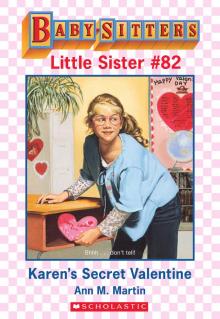 Karen's Secret Valentine
Karen's Secret Valentine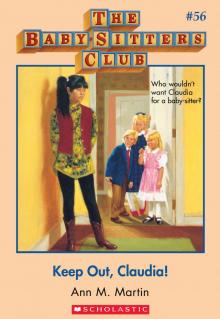 Keep Out, Claudia!
Keep Out, Claudia!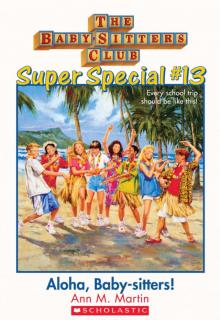 Aloha, Baby-Sitters!
Aloha, Baby-Sitters!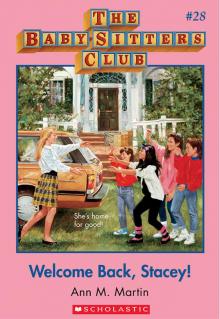 Welcome Back, Stacey
Welcome Back, Stacey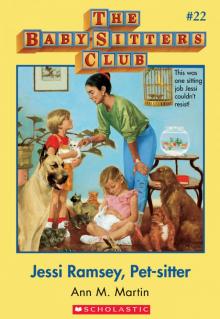 Jessi Ramsey, Pet-Sitter
Jessi Ramsey, Pet-Sitter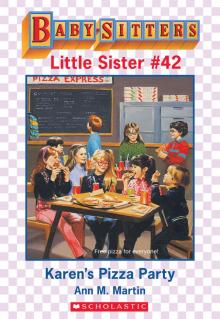 Karen's Pizza Party
Karen's Pizza Party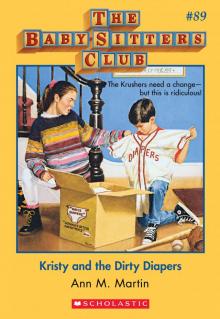 Kristy and the Dirty Diapers
Kristy and the Dirty Diapers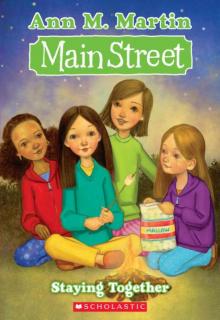 Staying Together
Staying Together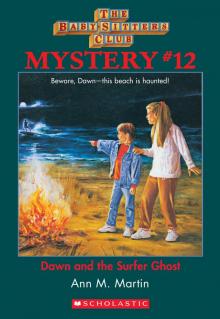 Dawn and the Surfer Ghost
Dawn and the Surfer Ghost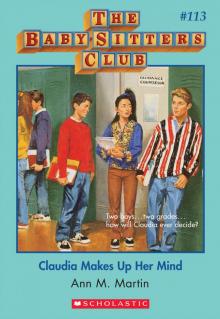 Claudia Makes Up Her Mind
Claudia Makes Up Her Mind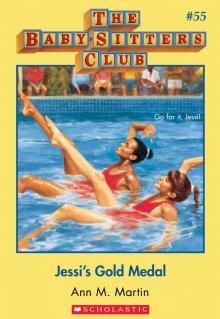 Jessi's Gold Medal
Jessi's Gold Medal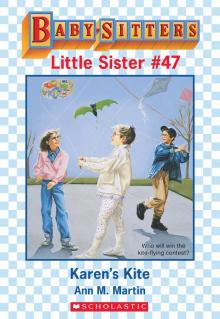 Karen's Kite
Karen's Kite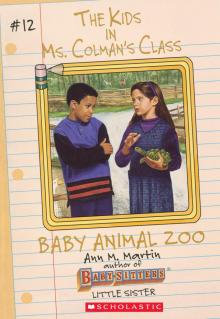 Baby Animal Zoo
Baby Animal Zoo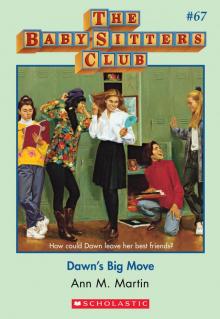 Dawn's Big Move
Dawn's Big Move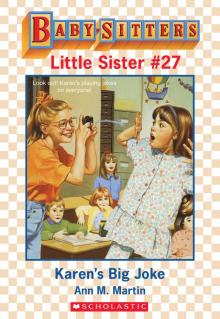 Karen's Big Joke
Karen's Big Joke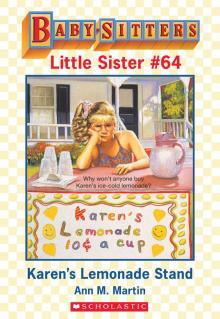 Karen's Lemonade Stand
Karen's Lemonade Stand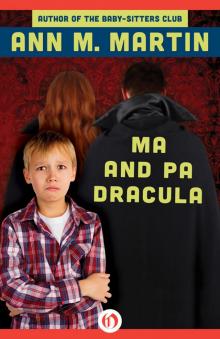 Ma and Pa Dracula
Ma and Pa Dracula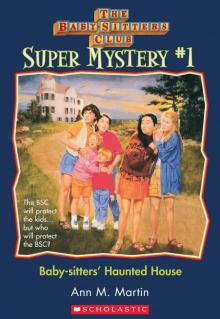 Baby-Sitters' Haunted House
Baby-Sitters' Haunted House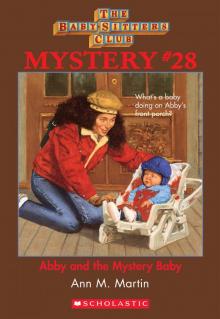 Abby and the Mystery Baby
Abby and the Mystery Baby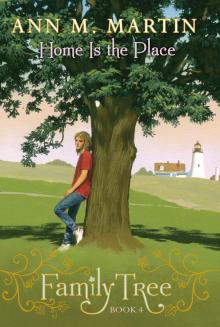 Home Is the Place
Home Is the Place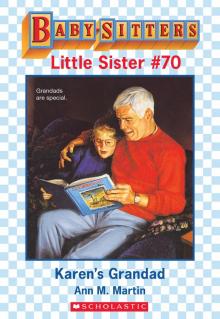 Karen's Grandad
Karen's Grandad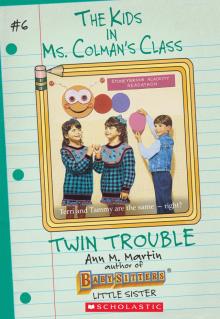 Twin Trouble
Twin Trouble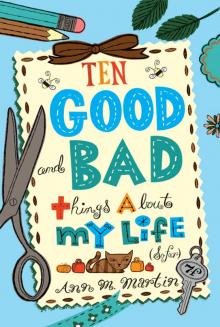 Ten Good and Bad Things About My Life (So Far)
Ten Good and Bad Things About My Life (So Far)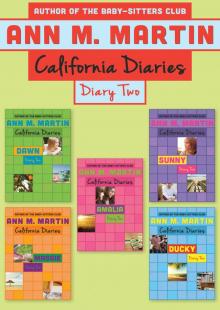 Diary Two
Diary Two Baby-Sitters Club 027
Baby-Sitters Club 027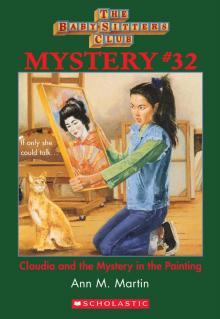 Claudia and the Mystery Painting
Claudia and the Mystery Painting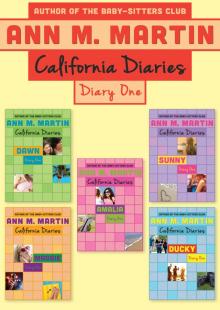 Diary One
Diary One Baby-Sitters Club 037
Baby-Sitters Club 037 Baby-Sitters Club 028
Baby-Sitters Club 028 Baby-Sitters Club 085
Baby-Sitters Club 085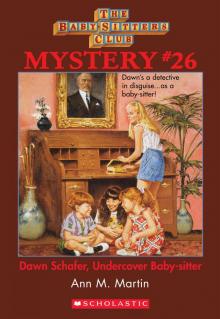 Dawn Schaffer Undercover Baby-Sitter
Dawn Schaffer Undercover Baby-Sitter Jessi's Babysitter
Jessi's Babysitter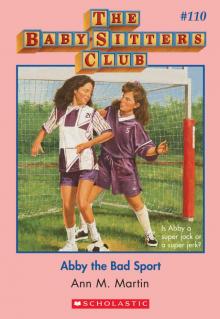 The Baby-Sitters Club #110: Abby the Bad Sport (Baby-Sitters Club, The)
The Baby-Sitters Club #110: Abby the Bad Sport (Baby-Sitters Club, The) Karen's Little Sister
Karen's Little Sister Baby-Sitters Club 058
Baby-Sitters Club 058 Claudia And The Genius On Elm St.
Claudia And The Genius On Elm St.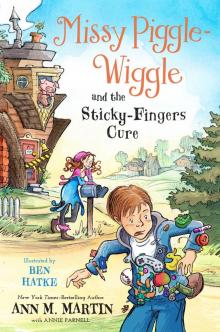 Missy Piggle-Wiggle and the Sticky-Fingers Cure
Missy Piggle-Wiggle and the Sticky-Fingers Cure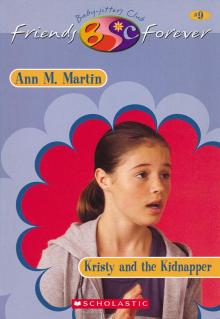 Kristy and Kidnapper
Kristy and Kidnapper Baby-Sitters Club 041
Baby-Sitters Club 041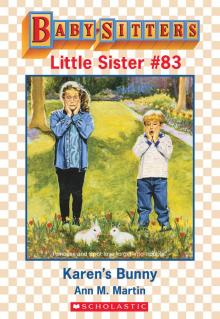 Karen's Bunny Trouble
Karen's Bunny Trouble Baby-Sitters Club 032
Baby-Sitters Club 032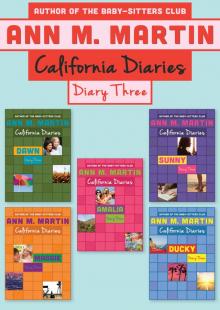 Diary Three
Diary Three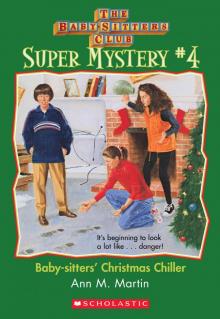 Christmas Chiller
Christmas Chiller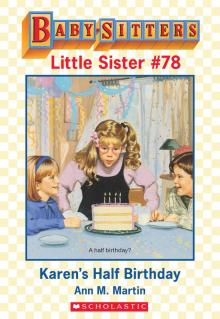 Karen's Half-Birthday
Karen's Half-Birthday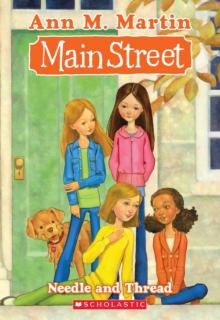 Needle and Thread
Needle and Thread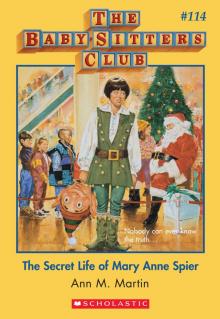 Secret Life of Mary Anne Spier
Secret Life of Mary Anne Spier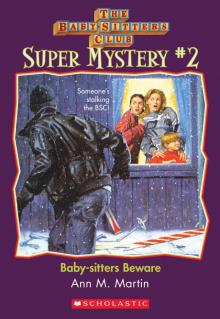 Baby-Sitters Beware
Baby-Sitters Beware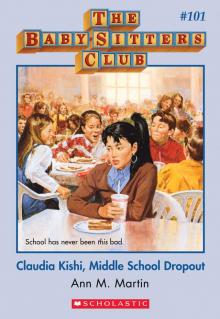 Claudia Kishi, Middle School Drop-Out
Claudia Kishi, Middle School Drop-Out Logan Likes Mary Anne !
Logan Likes Mary Anne ! Baby-Sitters Club 061
Baby-Sitters Club 061 Best Friends
Best Friends Baby-Sitters Club 031
Baby-Sitters Club 031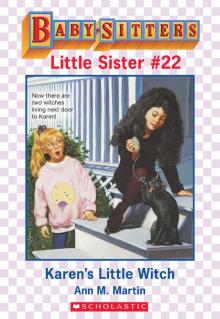 Karen's Little Witch
Karen's Little Witch Jessi Ramsey, Petsitter
Jessi Ramsey, Petsitter Baby-Sitters Club 123
Baby-Sitters Club 123 Baby-Sitters Club 059
Baby-Sitters Club 059 Baby-Sitters Club 033
Baby-Sitters Club 033 Baby-Sitters Club 060
Baby-Sitters Club 060 Baby-Sitters Club 094
Baby-Sitters Club 094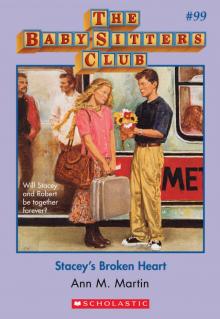 The Baby-Sitters Club #99: Stacey's Broken Heart
The Baby-Sitters Club #99: Stacey's Broken Heart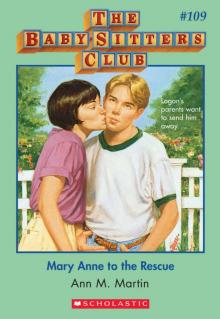 The Baby-Sitters Club #109: Mary Anne to the Rescue (Baby-Sitters Club, The)
The Baby-Sitters Club #109: Mary Anne to the Rescue (Baby-Sitters Club, The) Mystery At Claudia's House
Mystery At Claudia's House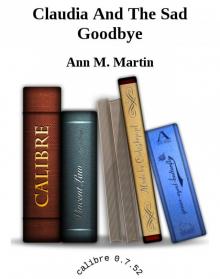 Claudia And The Sad Goodbye
Claudia And The Sad Goodbye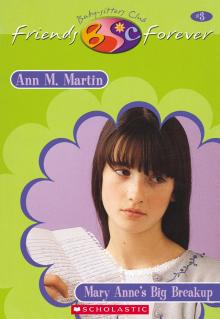 Mary Anne's Big Break-Up
Mary Anne's Big Break-Up Baby-Sitters Club 025
Baby-Sitters Club 025 Baby-Sitters Club 042
Baby-Sitters Club 042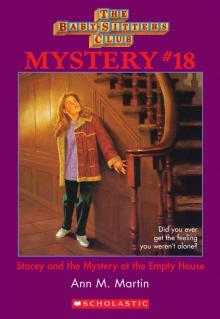 Stacey and the Mystery of the Empty House
Stacey and the Mystery of the Empty House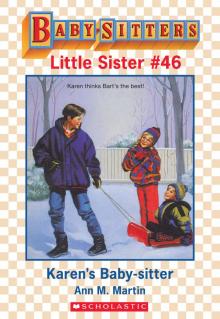 Karen's Baby-Sitter
Karen's Baby-Sitter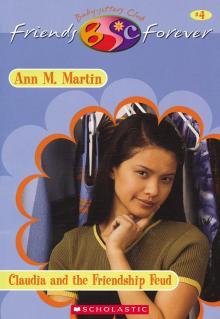 Claudia's Friendship Feud
Claudia's Friendship Feud Baby-Sitters Club 090
Baby-Sitters Club 090 Baby-Sitters Club 021
Baby-Sitters Club 021 Baby-Sitters Club 056
Baby-Sitters Club 056 Baby-Sitters Club 040
Baby-Sitters Club 040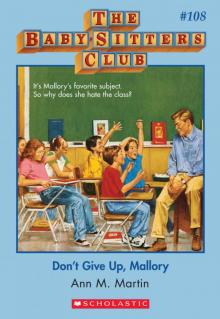 The Baby-Sitters Club #108: Don't Give Up, Mallory (Baby-Sitters Club, The)
The Baby-Sitters Club #108: Don't Give Up, Mallory (Baby-Sitters Club, The)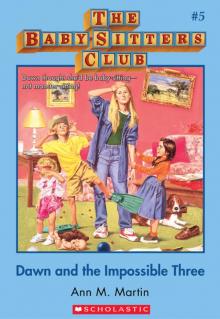 Dawn and the Impossible Three
Dawn and the Impossible Three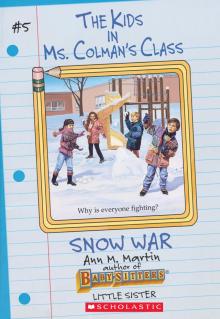 The Snow War
The Snow War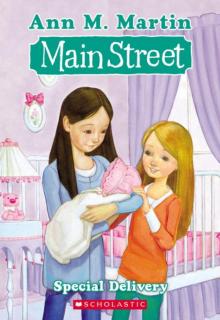 Special Delivery
Special Delivery Baby-Sitters Club 057
Baby-Sitters Club 057 Mary Anne And Too Many Babies
Mary Anne And Too Many Babies Baby-Sitters Club 030
Baby-Sitters Club 030